Young Opinion Session
Young Opinion Research Award
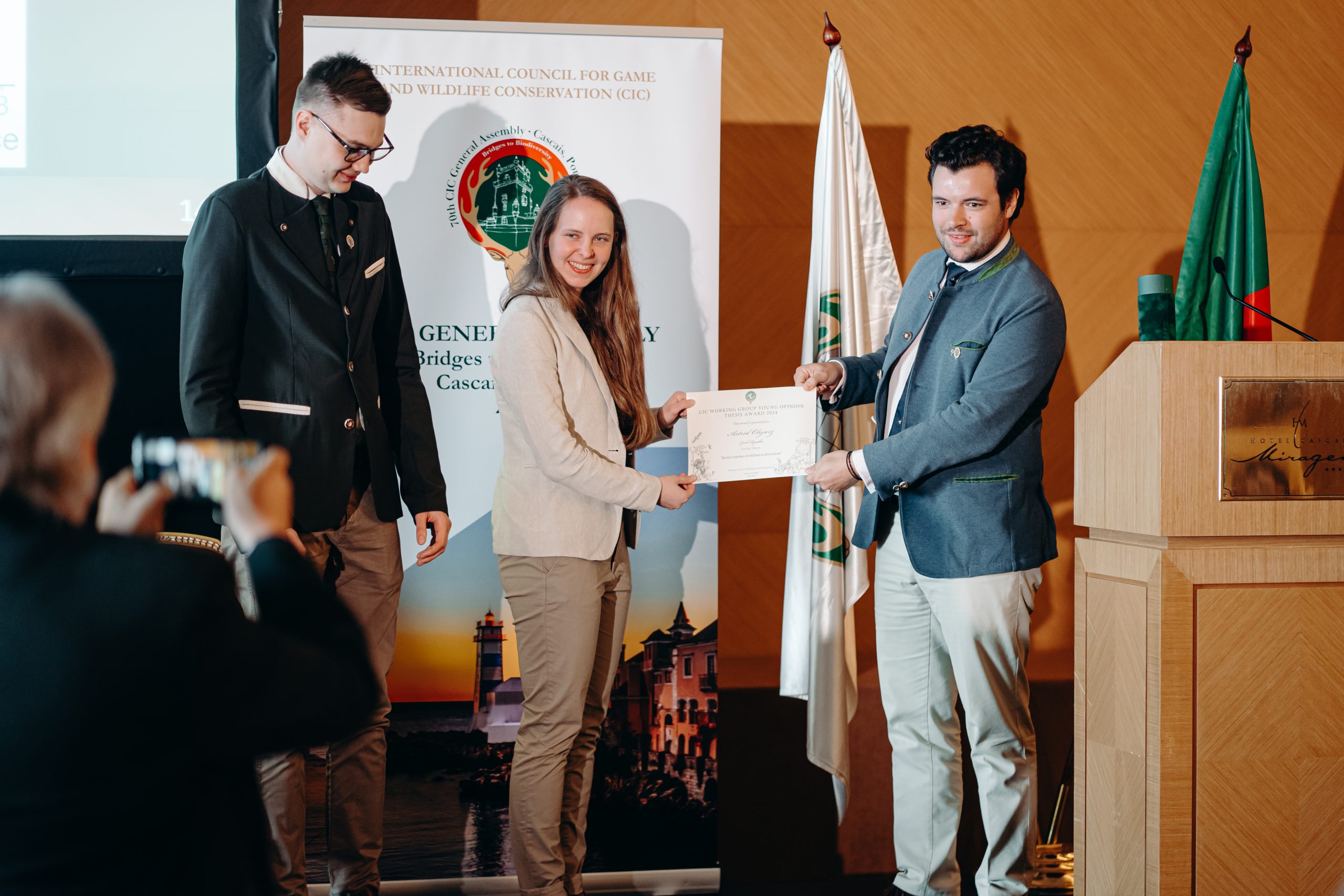
From left to right: Krzysztof Kowalewski (President of CIC Young Opinion Working Group), Astrid Olejarz (YO Research Award Winner) and Alexandros Karabalis (CIC Belgium Member)
Hosted every year by the Young Opinion Working Group, the Young Opinion Research Award aims to support researchers whose projects contribute to the sustainable use of wildlife resources. It recognises academic research that covers any or all of the three main pillars of sustainable wildlife management – economic, socio-cultural, ecological.
At the Young Opinion Session in Cascais, Astrid Olejarz from the Czech University of Life Sciences Prague was announced as the winner of the 2024 Young Opinion Research Award for her submission on Spatial Responses of Wild Boar to Driven Hunts.
During her speech – where she gave a presentation on the research – it was noted that human-induced environmental changes are leading to the extinction of some species, whilst others, such as the wild boar, are thriving to the point that they have been referred to as pests and invasives.
Drawing attention to controls such as indirect manipulation (fences), fertility control, and lethal controls, it was stated that hunting can lead to altered morphological traits, with her research looking into changes in behaviour.
Young Opinion Promotion Video
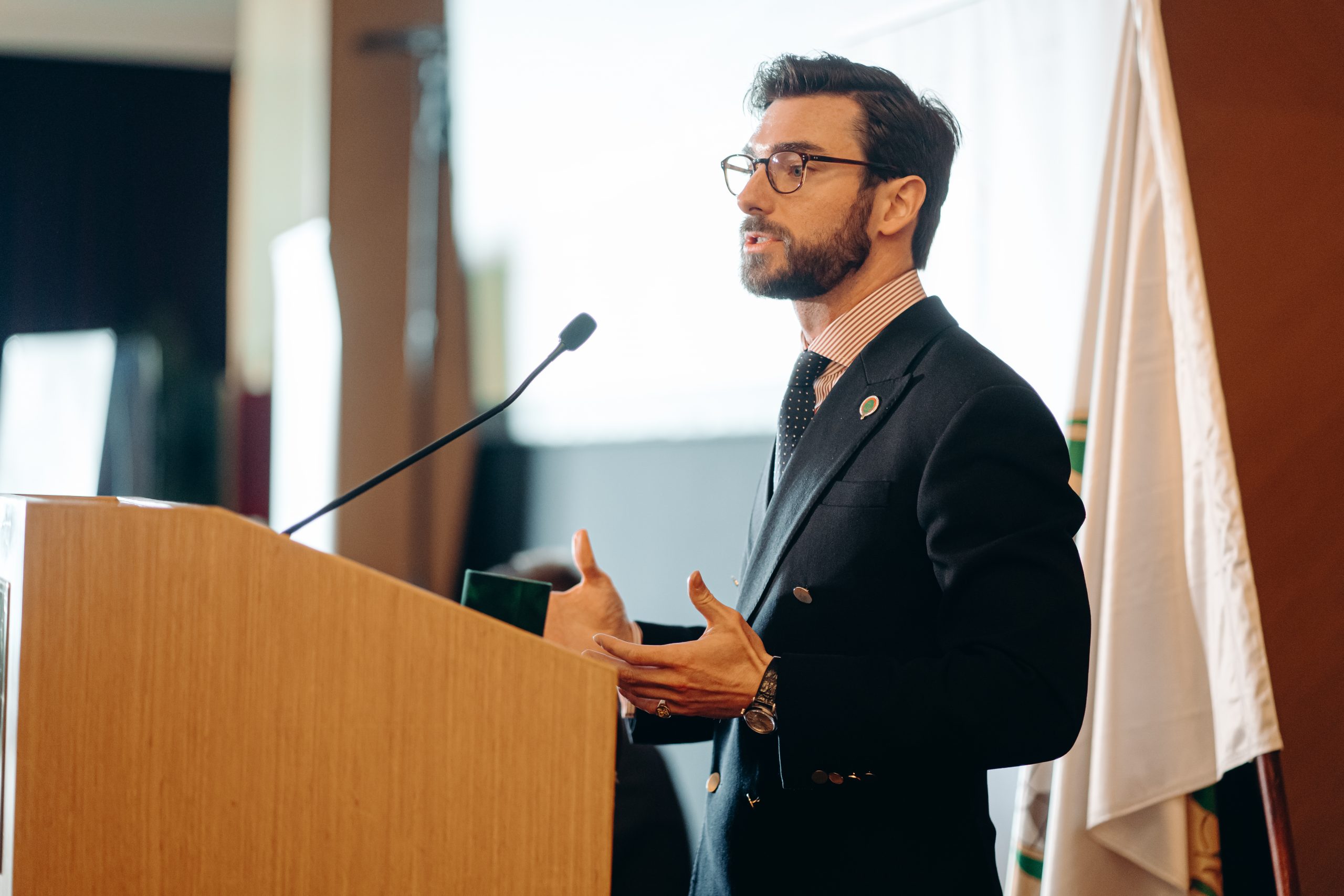
Lukas Hamilton Eddy, CIC Member from the UK
Lukas Hamilton Eddy (CIC Member from the UK) presented a Young Opinion Promotion Video which was filmed during a three-day hunt in France.
The video producers noted it was their mission to teach society about hunting, explaining that hunters respect nature and are there to protect it.
Eat, Prey, Dove: Is Meat the Key to a Good Public Image of Hunting
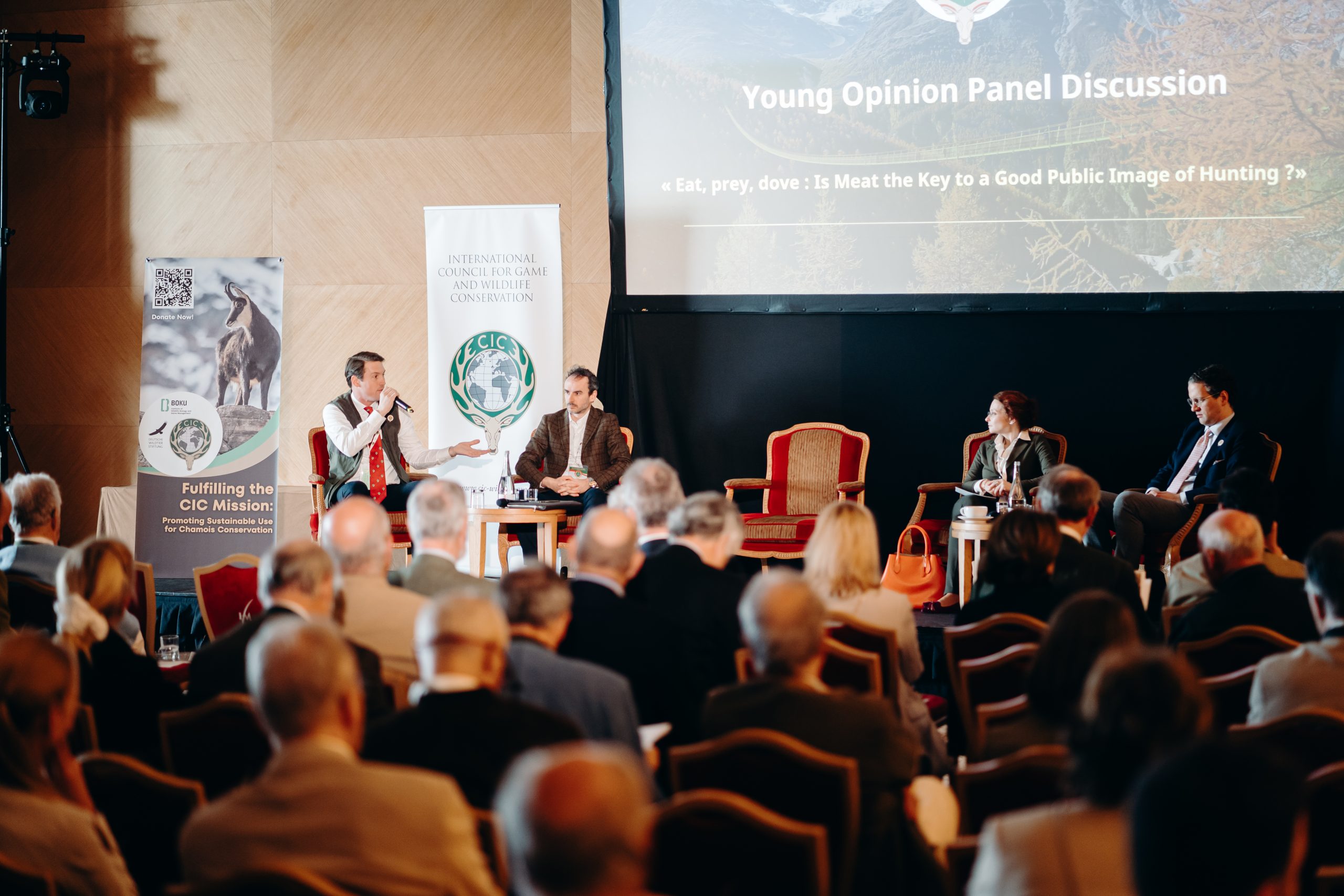
From left to right: Gerard Brodin (Head of the Swedish Delegation of the CIC), Vandrille Spire (CIC Member from France), Antje Bednarek (Veterinarian from Germany) and David Plaz (CIC Treasurer)
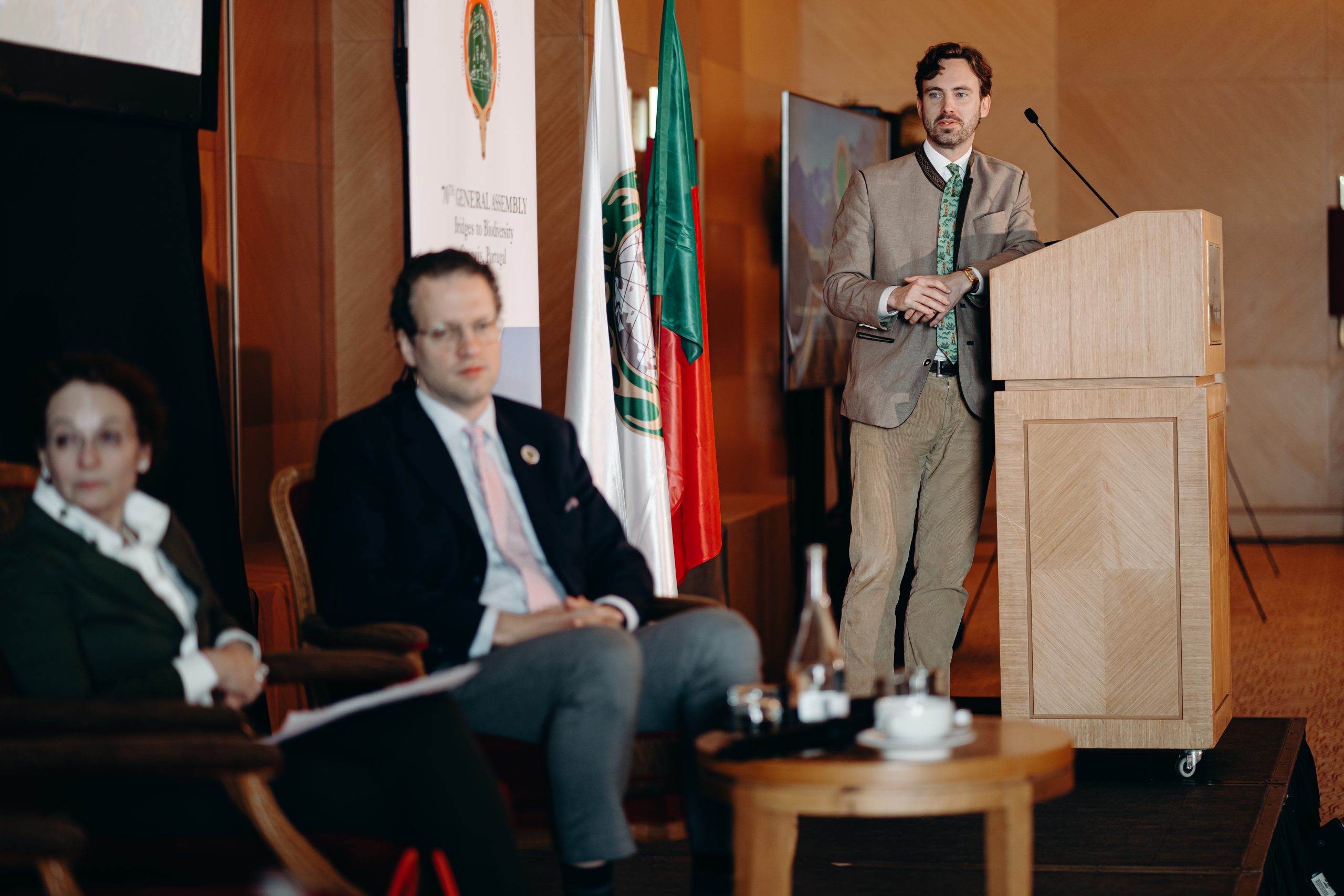
Moderator Oskar Tornvall, CIC Member from Sweden (far right)
This panel discussion moderated by Oskar Tornvall – CIC Member from Sweden – sought to explore game meat within a wider societal context of hunting and its public image.
Gerard Brodin, Head of the Swedish Delegation of the CIC, kicked off the discussion by detailing his business operations in Sweden selling game meat to supermarkets. He described the different stages in the supply chain, including the involvement of big hunting estates, as well as the transport and preparation of the meat.
On the topic of end-consumer habits and requests, it was suggested that there was a propensity for climate-friendly, local, antibiotic-free meat, harvested using ethical slaughtering methods and containing high levels of vitamins and minerals. He also underscored a trend for ready-meals, driven by a lack of time to cook.
It was further added that hunting seasons dictate that commercial production has to be frozen rather than fresh, while noting that positioning freezers strategically within supermarkets is a way to entice consumers.
David Plaz, CIC Treasurer and a co-owner in a game meat product company that trades into Asia, cautioned about the difficulties of the sector, referencing the barriers in organisation, seasonality and hygiene requirements. He described difficulties in convincing consumers of game meat and its sub-categories, while at the same time reversing beliefs in the difficulty of cooking game. It was noted that as legislation evolves across Europe, game meat will inevitably become more processed.
Addressing the topic from a different perspective was Antje Bednarek, a veterinarian from Germany who discussed the relationship between game meat to zoonosis. She drew parallels between regulations for game meat and farm animals, highlighting that game does not have as many problems as the products from farm animals. It was noted that the German government is pushing for decreased meat consumption and promoting veganism.
Vandrille Spire, CIC Member from France, spoke about his association in France which promotes game meat with the objective of bringing together all stakeholders to communicate with one voice on public health and the environment.
He noted work conducted to create a label of trust for game meat, stating that the French market boasts 65 million consumers. All French game meat goes to export and comes back via imports in a few restaurants for Christmas and is perceived as elitist food. Problems of social acceptance were reiterated, but it was underscored that the French love their food. He drew attention to dynamic new markets and online shops that sell fresh meat directly, expressing his hope that French game meat would be kept and consumed in France on the road ahead.
Artemis Session
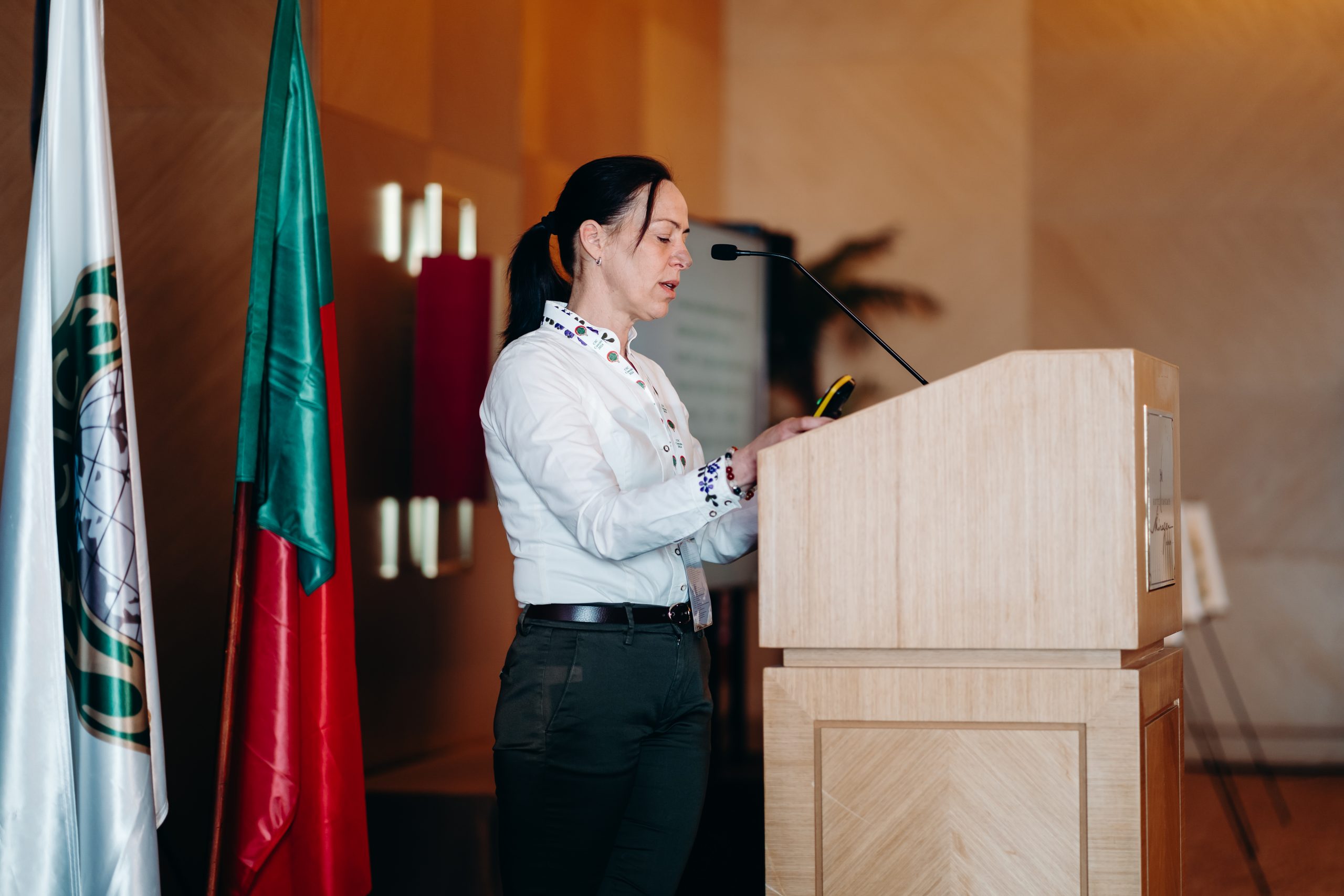
Beatrix Bán, President of the Artemis Working Group
As the newly elected President of the Artemis Working Group, Beatrix Bán provided a historical perspective of the Group, noting that the number of female hunters is on the rise in Europe and the US.
The Women and Sustainable Hunting (WaSH) conference hosted annually by Artemis was highlighted, noting the work being done to give a platform for female hunters. Drawing attention to the CIC World Game Cookbook, a project of the Artemis Working Group, it was stated that wild game is the food of the future and a good way to introduce people to the practice of hunting.
On the road ahead, she called for a better way of communicating about hunting, while underlining the importance of furthering education for younger generations on wildlife.
Following this, CIC Member from Portugal Susana Silva, gave a presentation on women, hunting and rural development, with a particular focus on the Portuguese perspective. She drew attention to a publication “Hunting by Huntresses” which recounts tales on hunting, countryside and happiness, providing a holistic view of hunting to broader audiences.
When discussing the issues facing hunters today, excessive bureaucracy as well as administrative and financial burdens were highlighted in particular. For women, gender inequality was raised as an ongoing issue that needs to be addressed.
Indigenous Peoples and Local Communities (IPLC) Session
As the first opportunity to address the CIC General Assembly since its establishment at the 69th General Assembly in Paris last year, this session sought to introduce delegates to the Working Group while exploring work being done to support IPLCs across the globe. This session was moderated by Dr. Robert Kroger, Founder and Executive Director of Blood Origins.
A video message from Bupe Banda, Chair of the IPLC Working Group, who was not able to join the General Assembly in Cascais, was played for those in attendance, where it was stressed that IPLCs have long been custodians of the natural world. Despite this, they are facing numerous challenges. She called for shared solutions based on best practices and for the rights of IPLCs to be strengthened and supported, bridging the gap between them and policymakers.
Dr. Enkhtuvshin Shiilegdamba, Head of the Mongolian Delegation of the CIC and CIC One Health coordinator, then gave a presentation on the local herding communities in Mongolia, who live in harmony with nature and wildlife. The responsibilities of local herding communities in preserving nature was stressed, with particular challenges in the rangelands attributed to degradation and limited water resources. Noting that traditional culture and knowledge are being lost and the closing of local hunting associations, she underscored that local communities in Mongolia have no rights to hunt, notwithstanding their role as stewards.
Drawing attention to his work on the ground with IPLCs in South Africa was Thabang Teffo, Head of Responsible Resource Management at the South African Wildlife College (SAWC). In particular, his efforts largely pertain to supporting the rights of IPLCs. It was noted that indigenous knowledge systems were of particular importance, with IPLCs holding significant knowledge that had huge scientific relevance.
Flávio Bezerra Barros, Professor at the Federal University of Pará and Advisor to the Lula Presidency on Indigenous Peoples, then spoke about his work as an anthropologist working with IPLCs in the Amazon. Focusing on the hunting needs of indigenous peoples, it was stated that land rights and the political interests of large corporations are large hurdles that need to be overcome. He called for international cooperation to raise awareness of the plight in the Amazon, its IPLCs and the vital need to recognise their hunting practices.
CIC Coordination Fora
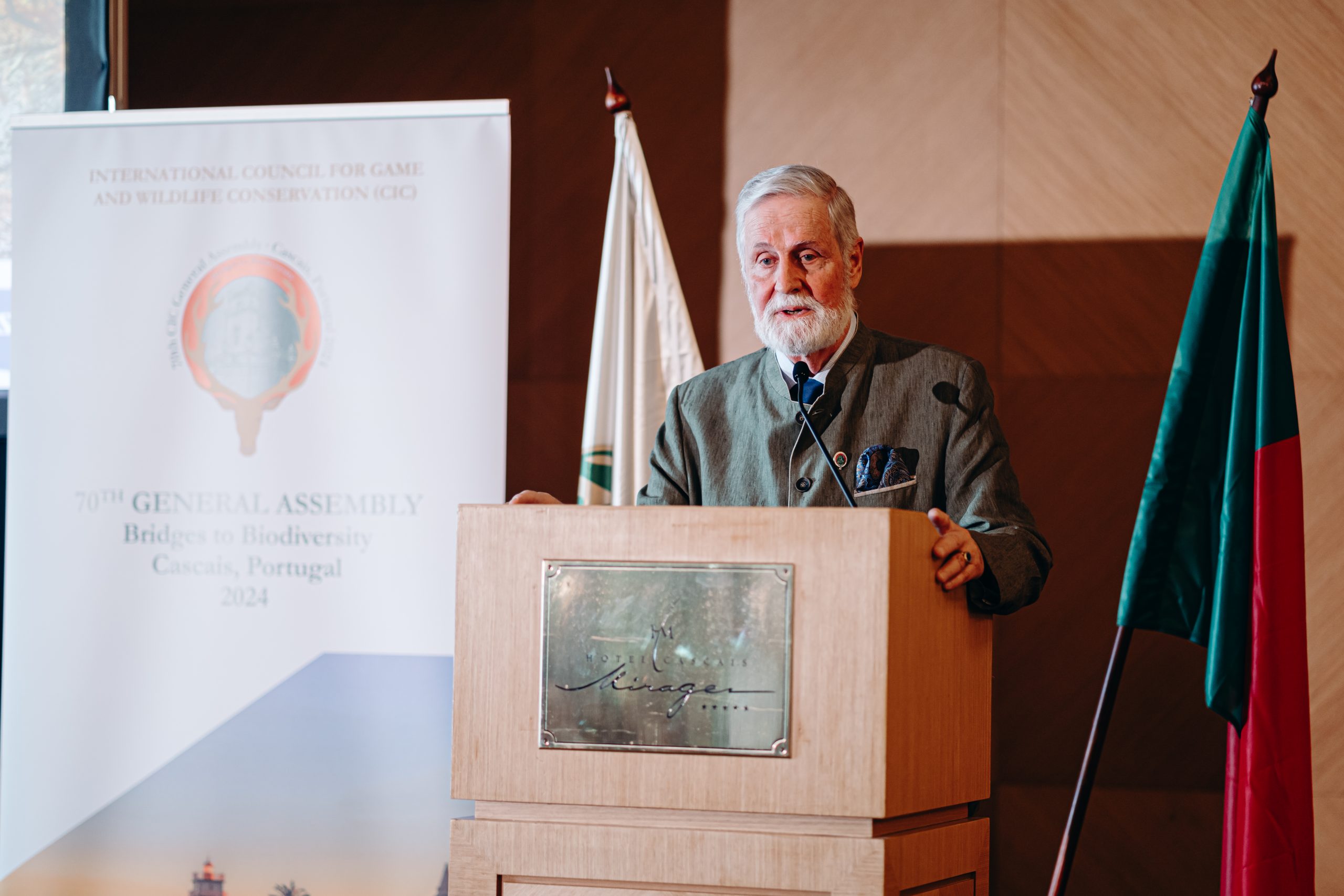
Mikael Antell, President of the Nordic and Baltic Coordination Forum
Mikael Antell, President of the CIC Nordic and Baltic Coordination Forum, addressed the General Assembly for the first time since the Baltic region was added as a component of the Forum. As part of his intervention, he discussed the management of large carnivores and other species including grey seals in the Nordic region, with examples of the usefulness of hunters in reducing pressure on endangered species by abundant ones given. It was noted that the aim of the Forum is to support all stakeholders with knowledge, to help them convince their authorities that action needs to be taken.
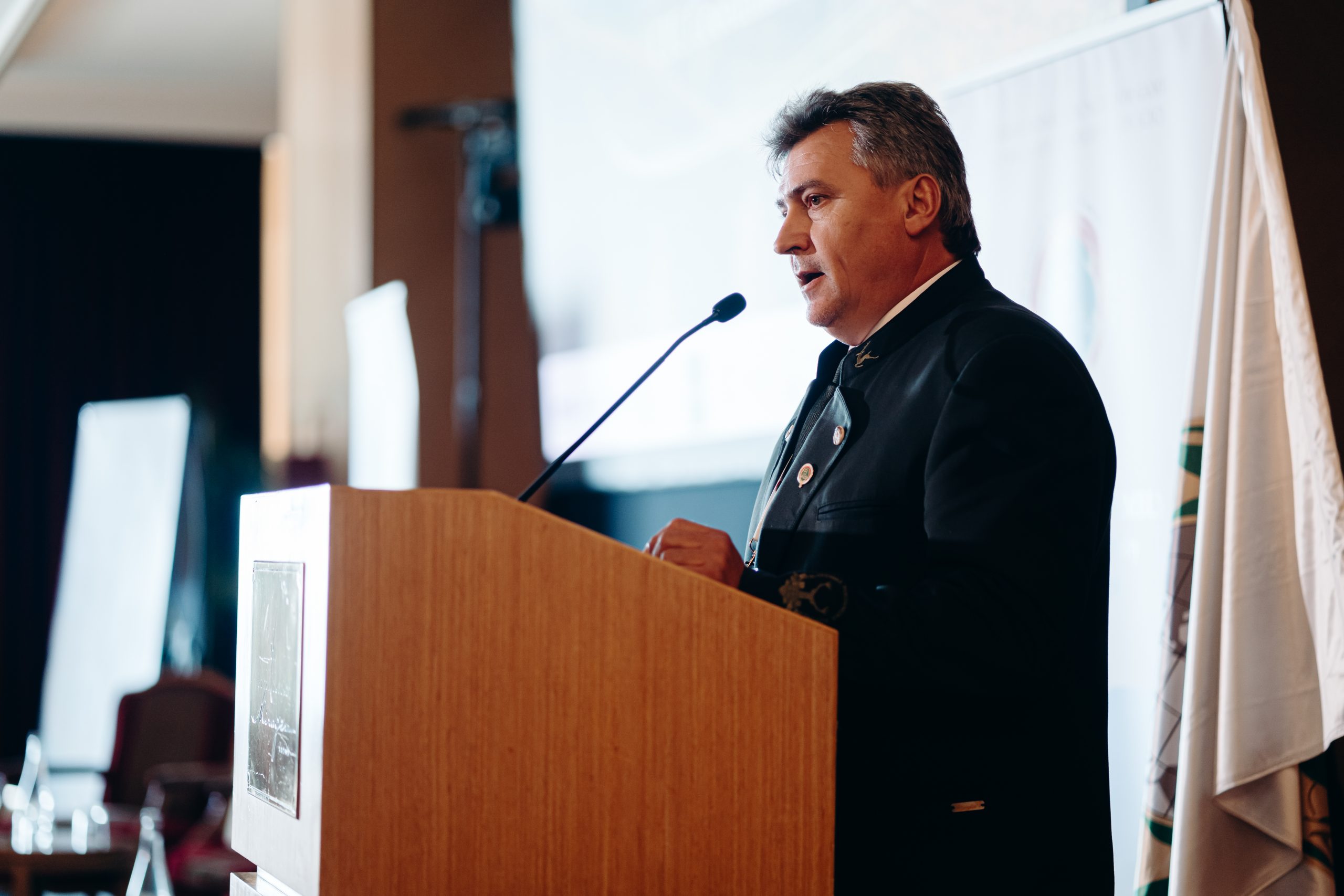
Dr. Imrich Suba, President of the Coordination Forum for Central and Eastern Europe
The newly elected President of the CIC Coordination Forum for Central and Eastern Europe, Dr. Imrich Suba, then provided a brief history of the Forum which was founded to unite hunters after the Yugoslavian war. A brief update on the activities of the Forum was also given, including work to advance on African Swine Fever monitoring across the region as well as the possible introduction of science-based journal for hunting relevant articles.
Bridging Nations for 2030 Biodiversity Action: Uniting Existing and New State Members
With a need for cooperation and joint action to effectively implement the ambitious 2030 Strategic Plan, building on existing relationships and forging new ones will be vital for the CIC. This session sought to garner the perspective of CIC State Members on the current global state of conservation, while at the same time looking where the future may lie for the CIC.
Dr. Philipp Harmer, President of the CIC, opened by giving an introductory speech, recalling that the CIC Statutes were written by Dr. Wolfgang E. Burhenne of the International Union for Conservation of Nature (IUCN), which served as the foundation for the existence of CIC State Members and the CIC’s subsequent diplomatic status.
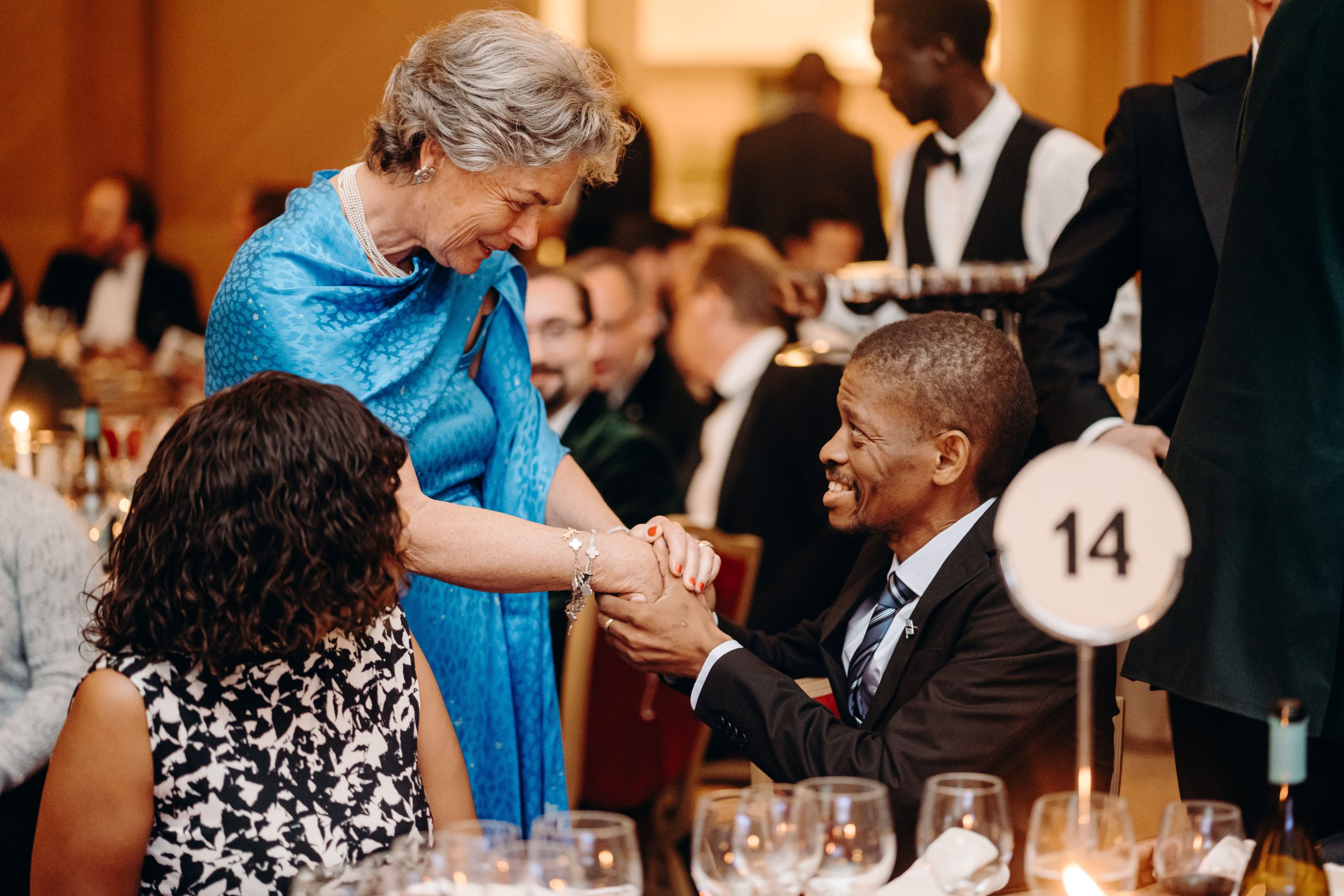
H.E. Mr Dumezweni Mthimkhulu, Minister of Environment and Tourism for Botswana (far right)
As part of this session, Dr. Harmer announced the news that the Republic of Botswana will join the CIC as a State Member, with H.E. Mr Dumezweni Mthimkhulu, Minister of Environment and Tourism for Botswana, addressing delegates in Cascais later in the evening. In an advance press release on Botswana’s CIC State Membership and Minister Mthimkhulu’s attendance at the General Assembly, it was stated “Botswana rejoins the CIC at a time when several western countries have been considering laws that seek to ban the import of hunting trophies into those countries.”
Under the newly adopted 2030 Strategic Plan, the CIC will support a conservation strategy for Botswana that embraces its core principles of environmental management, sustainable development and poverty eradication.
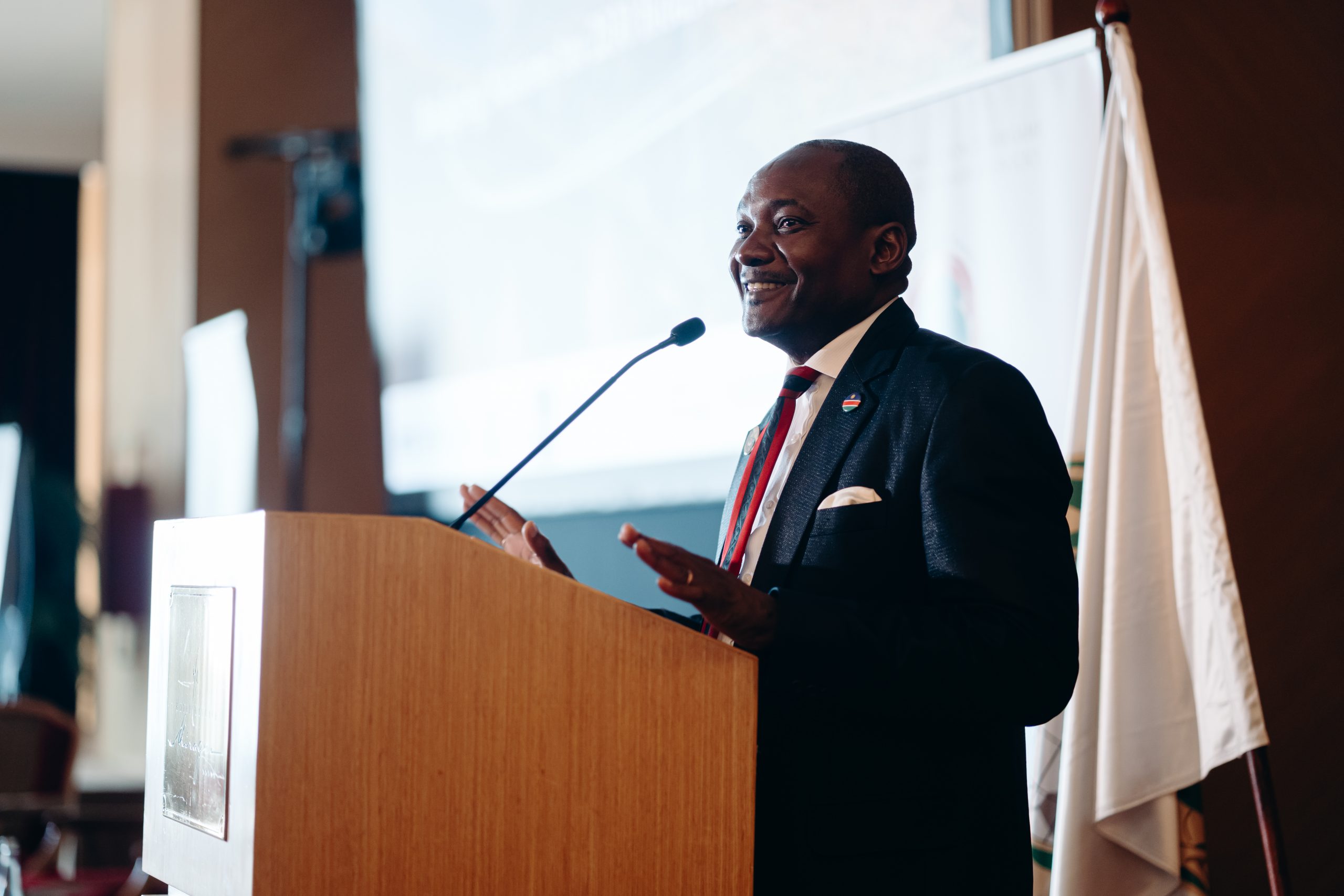
H.E. Mr. Pohamba Penomwenyo Shifeta, Minister of Environment, Forestry and Tourism for Namibia
H.E. Mr. Pohamba Penomwenyo Shifeta, Minister of Environment, Forestry and Tourism for Namibia, then addressed delegates as the representative for a long-standing CIC State Member. He recognised the leadership of the CIC and praised its work on national economies and local communities, safeguarding wildlife for future generations.
Broadly cautioning against neo-colonial approaches, it was stated that negative developments in biodiversity conservation, such as the proposed trophy import bans, require early warning signals. He also called for new partnerships to further nature conservation and for national sovereignty to be respected.
As a closing comment, it was mentioned that sustainable hunting in Namibia is informed by science, with national quotas based on facts. With the carrying capacity for elephants having already been reached in Namibia and Botswana, human-animal conflicts are inevitable; proceeds from trophy hunting can therefore help support local communities in this regard.
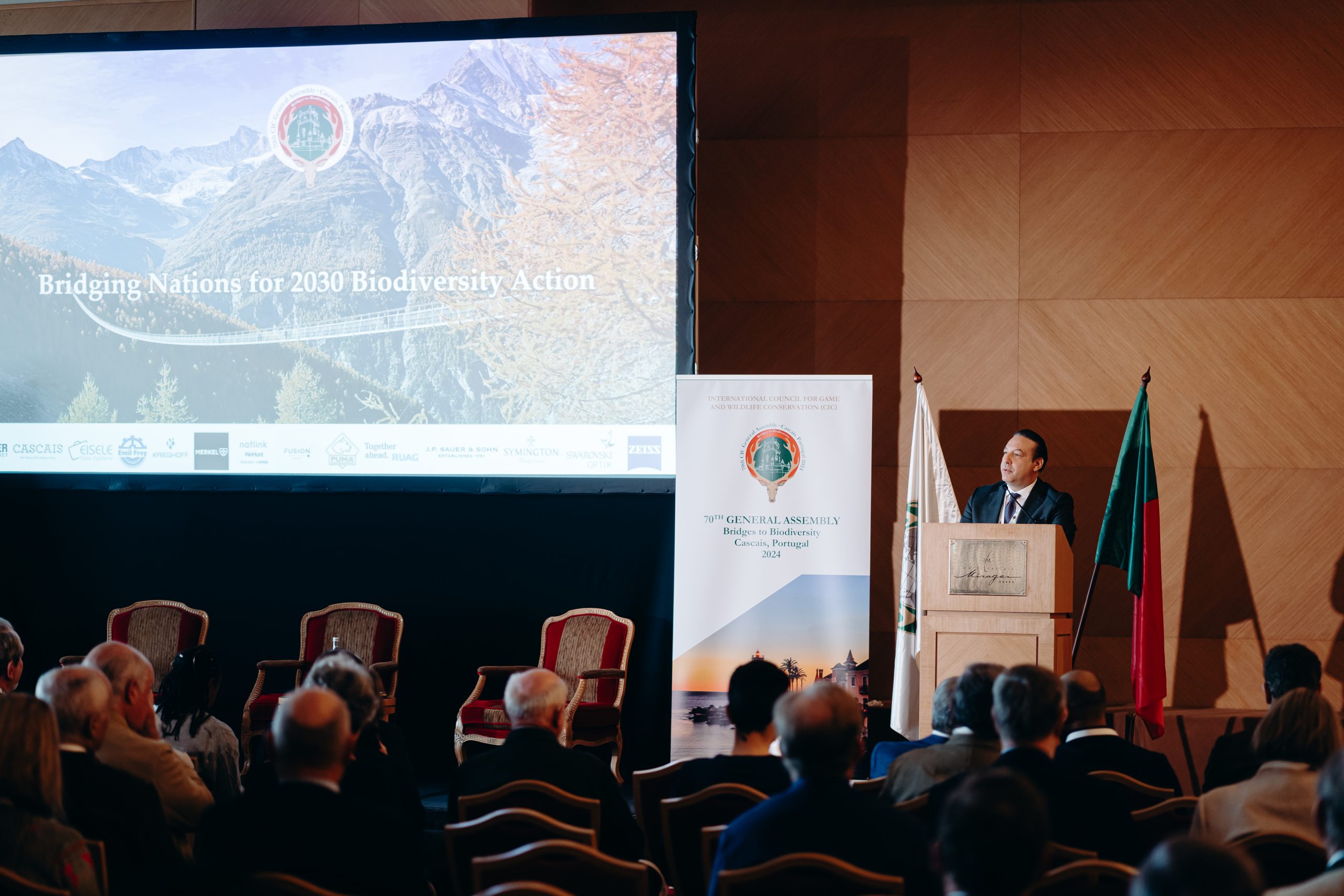
Brigadier General Donato Monaco, Deputy Chief of Staff of the Ministry of Agriculture Food Sovereignty and Forests for Italy
Brigadier General Donato Monaco, Deputy Chief of Staff of the Ministry of Agriculture Food Sovereignty and Forests for Italy, then provided his perspective as the Vice President of the National Wildlife Hunting Committee. He reiterated the Committee’s objective to reconcile the relevant needs to preserve biodiversity and protect wildlife by carrying out hunting activities. Referencing an upcoming change in Italy’s hunting laws, it was stated that Italy is looking upon the work of the CIC in advocating for conservation through sustainable use with great interest.
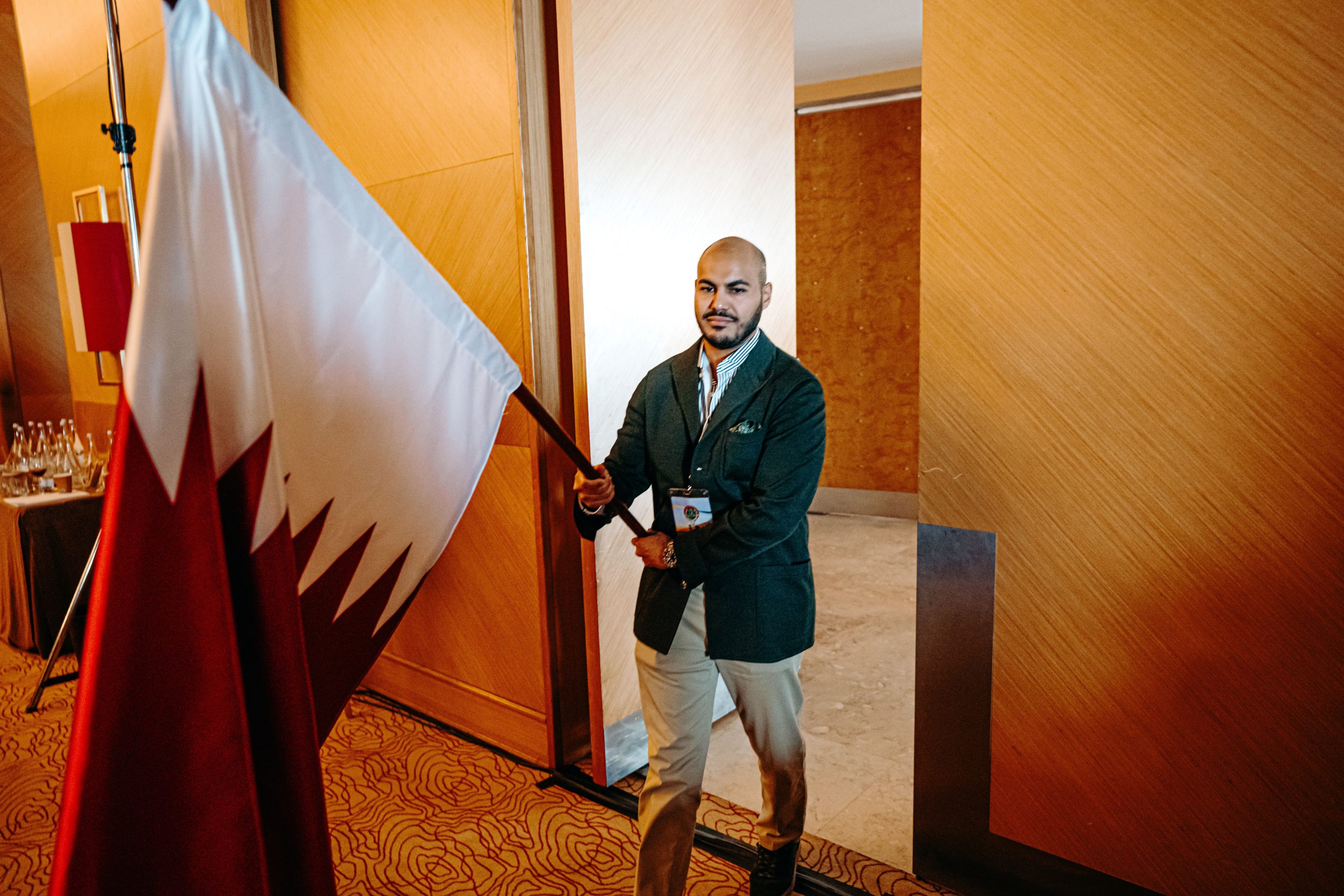
H.E. Sheikh Fahad bin Abdulrahman Al Thani, Member of the Ruling Family of Qatar and Officer in the Qatar Armed Forces
To close this session, H.E. Sheikh Fahad bin Abdulrahman Al Thani, Member of the Ruling Family of Qatar and Officer in the Qatar Armed Forces, unveiled Qatar as the hosts for the 71st General Assembly next year, which will take place in Doha from 24-27 April 2025. As part of his comments, he drew attention to the CIC strategic goals and expressed a desire to help bridge relationships between all nations in the field of hunting and sustainability.
Bridging Local Perspectives: Paving the Way Forward on One Health, Human-Wildlife Conflict and Climate Change
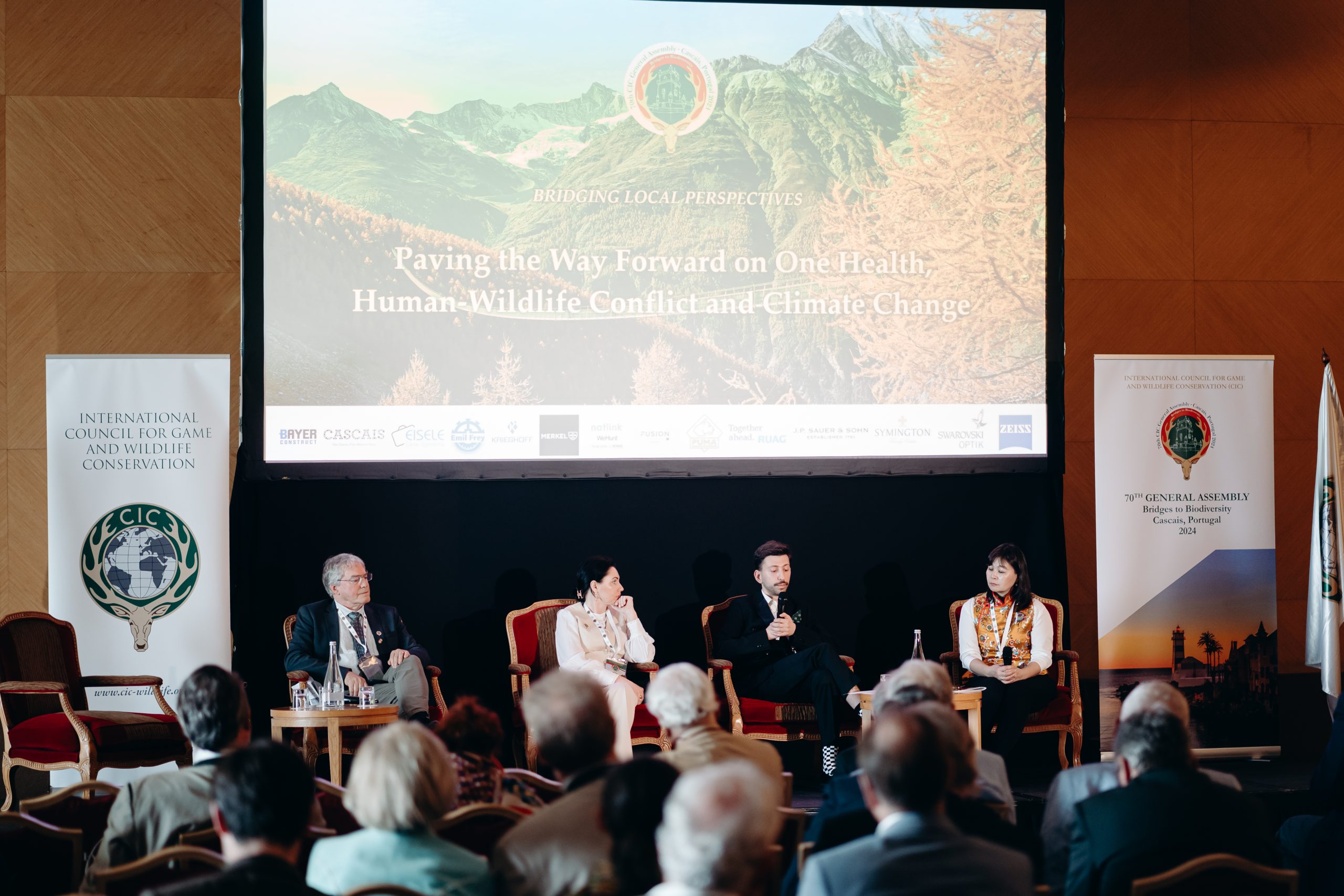
From left to right: Kurt Alt (Conservation Director, Montana & International Programs, Wild Sheep Foundation), Olga Dzhochka (Head of the Ukrainian Delegation of the CIC), Merab Dvalidze (Senior Specialist at the Ministry of Environmental Protection and Agriculture of Georgia) and Dr. Enkhtuvshin Shiilegdamba (Head of the Mongolian Delegation of the CIC and CIC One Health coordinator)
With One Health, human-wildlife conflict and climate change an integral part of the global sustainable development agenda, this session explored how different elements of the CIC network were addressing these issues.
Opening the discussion was Dr. Enkhtuvshin Shiilegdamba, Head of the Mongolian Delegation of the CIC and CIC One Health coordinator, who gave a presentation on human-wildlife conflict in Mongolia, noting that conflicts can lead to health threats to biodiversity and people. The risks of disease spillover from wildlife to humans (and vice versa) and the major degradation of nature caused by livestock were listed as the major ongoing issues in the country. She highlighted the need for data collection to inform decision-making and emphasised the usefulness of the One Health approach, applauding the CIC for taking it up.
Olga Dzhochka, Head of the Ukrainian Delegation of the CIC, then went on to describe the state of zoonotic diseases in her country, with a particular focus on rabies. It was noted that hunting activities have been prohibited since 2022, while numbers of stray dogs and cats have increased, which has led to the number of rabies cases doubling in this short period of time.
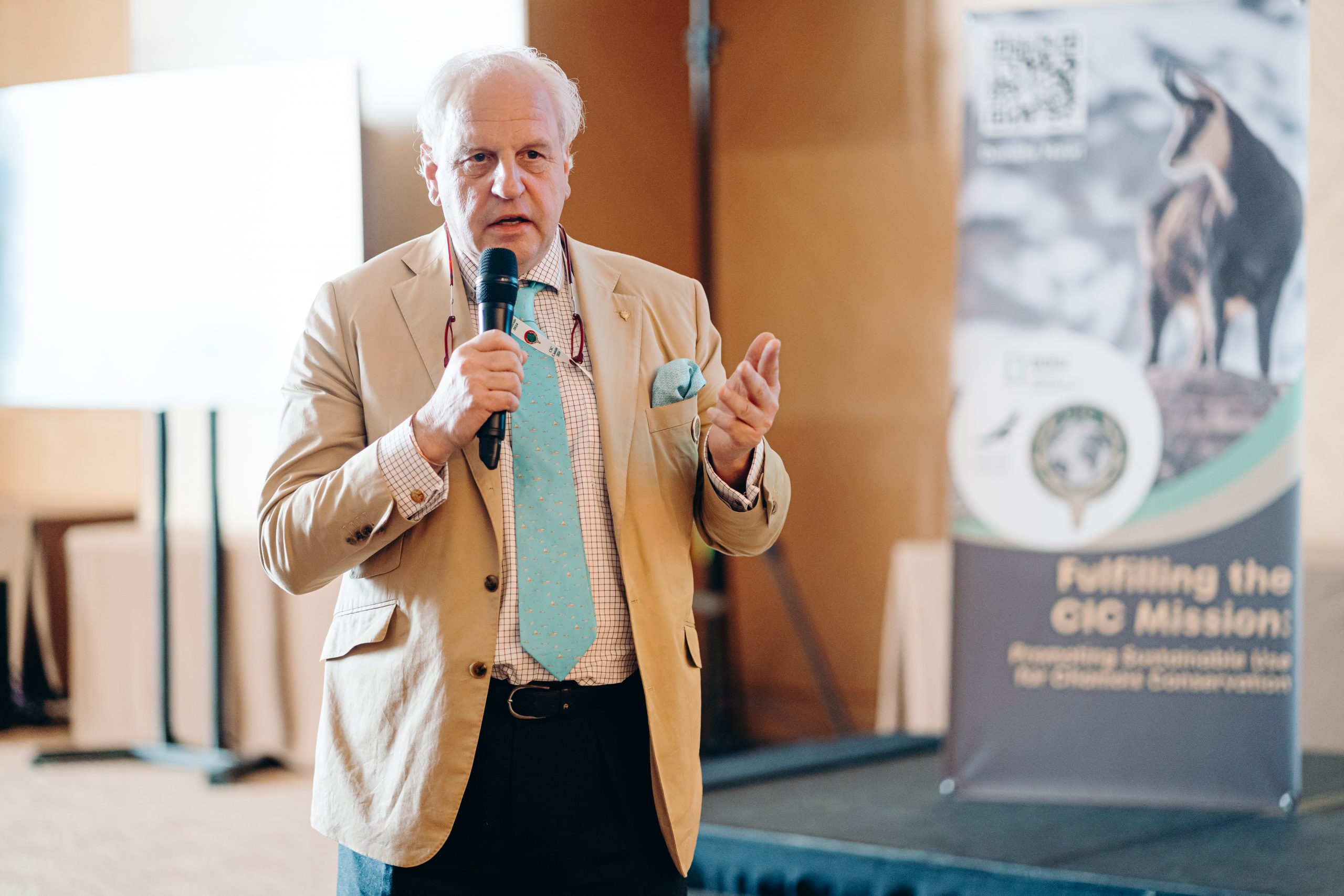
Dr. Wilhelm von Trott zu Solz, CIC Advisor
In response to this intervention, CIC Advisor on One Health Dr. Wilhelm von Trott zu Solz addressed delegates from the floor, announcing that the Order of Malta has voiced preliminary support to help Ukraine combat rabies, which may result in funding for a project, as well as the supply of veterinarians to vaccinate infected animals in the country.
Discussing the prevailing state of affairs in his country of Georgia was Merab Dvalidze, Senior Specialist at the Ministry of Environmental Protection and Agriculture of Georgia. Illegal hunting has been a huge problem for years in the country, with a history of poaching which wiped out several species. He then explained instances of human-wildlife conflicts with large carnivores, as well as the impact of household waste in attracting carnivores to urban areas. As closing comments, new national rules for regulating wildlife were outlined, including cull numbers for wolves and jackal.
Kurt Alt, Conservation Director, Montana & International Programs, Wild Sheep Foundation (WSF), discussed a project in Montana which illustrated that domestic sheep suffer when infected with a pathogen found in wild sheep. He underscored that 8 million USD over 5 years was committed to addressing habitats, predation, pathogen genetics and the development of science-based solutions to minimise comingling; the Department of Agriculture is now looking at immunological solutions for domestic sheep.
To close this session, the CIC and the Wild Sheep Foundation (WSF) announced the signing of a new Cooperation Agreement. This partnership between WSF and CIC will create an opportunity to develop a dynamic joint programme that embodies the vision and mission of both organisations, with a particular focus on sustainable use and the One Health approach. Efforts will contribute to the objectives of a number of Multilateral Environmental Agreements (MEAs), engage in joint public education and capacity-building efforts, with the scope of work focused in Central Asia as well as beyond.
A Vaccine Against African Swine Fever
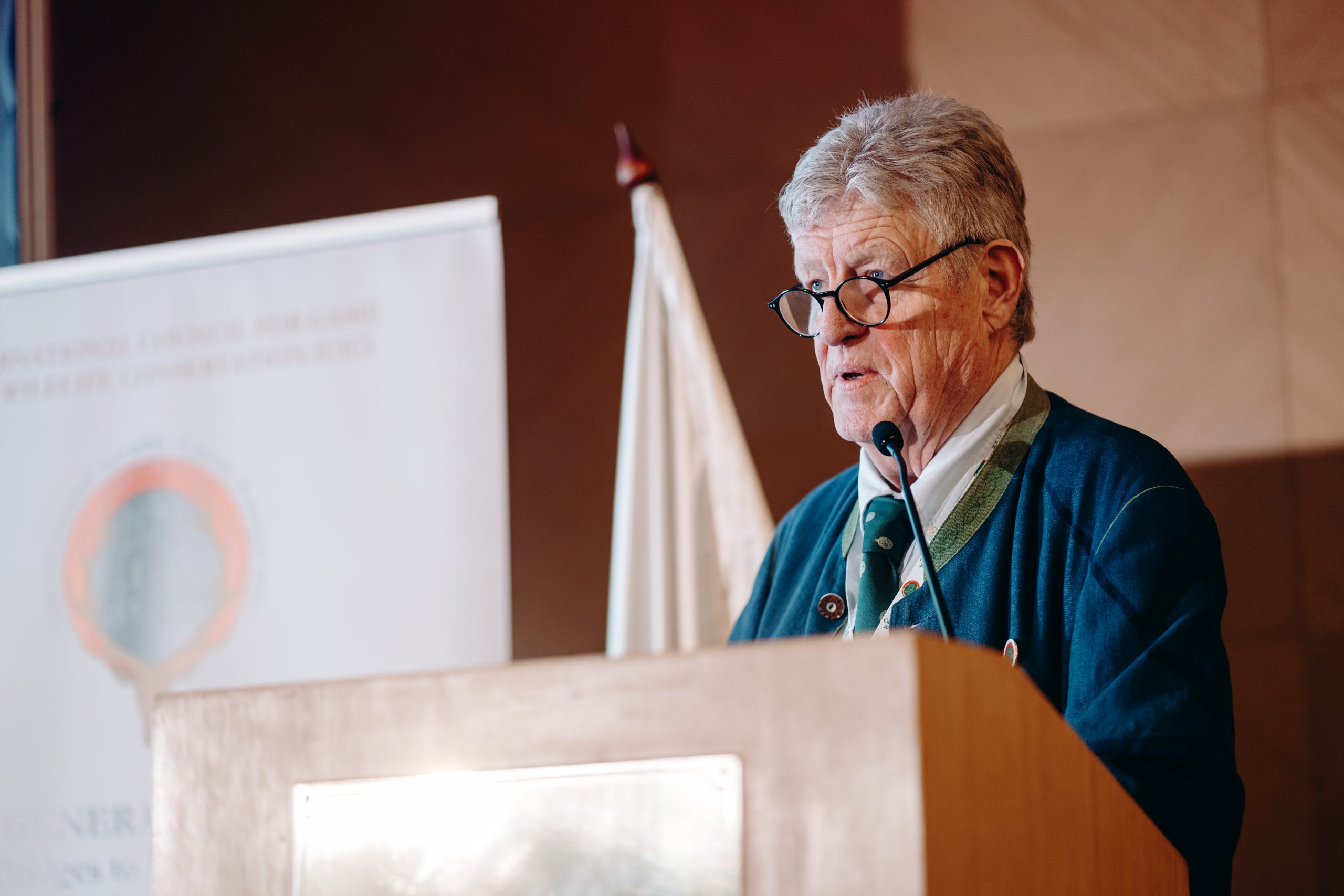
Count Dr. Torsten Mörner, Associate Professor of Wildlife Diseases at the University of Agricultural Sciences (Uppsala) and Vice President of the CIC
This session was moderated by Count Dr. Torsten Mörner, Associate Professor of Wildlife Diseases at the University of Agricultural Sciences (Uppsala) and Vice President of the CIC, who provided context by giving an overview of African Swine Fever and its impacts in Europe.
He noted that the virus is extremely resistant, including to prohibitive conditions such as low temperatures, and can be carried in sausages or cured meat, which easily leads to the spread of the disease. Tics were listed as another source of contamination.
After illustrating hunter involvement and other measures used to combat the disease, it was concluded that based on the Swedish experience, African Swine Fever can be eradicated, but that rolling out a vaccine would be much easier.
Dr. Árpád Sárkány, Vice President of the CIC, added further context describing the effects of the African Swine Fever as a true catastrophe. In search of a solution, he outlined the funding put towards a vaccine for wild boar populations. This resulted in the introduction of four fenced hunting areas in Hungary – with the support of the Deputy Prime Minister of Hungary Zsolt Semjén – which facilitated research on how the vaccine impacts large populations of wild boar.
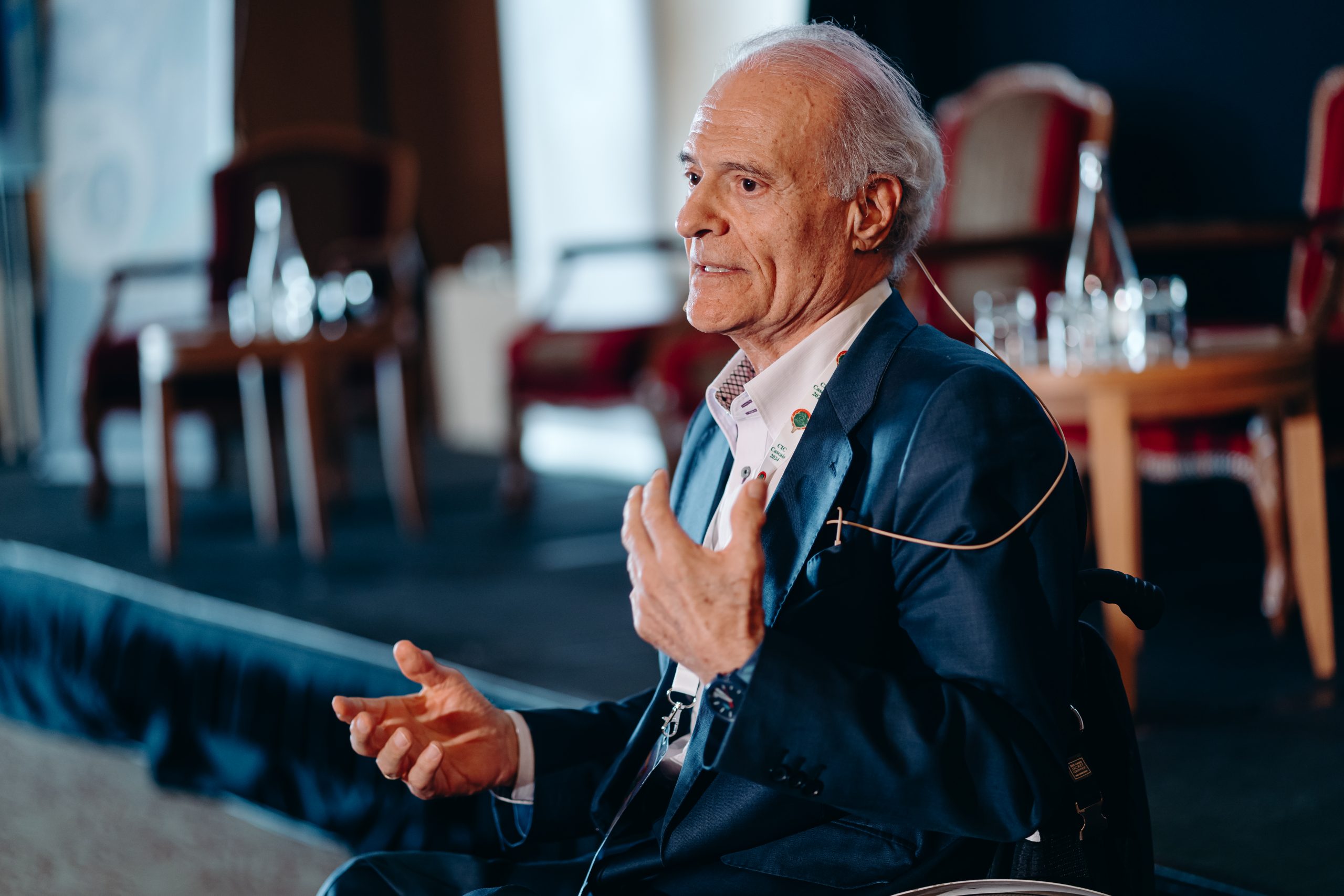
Dr. José Manuel Sánchez-Vizcaíno Rodríguez, Emerit Professor of the Department of Animal Health of the Veterinary School of the Complutense University of Madrid
Presenting this research as its lead researcher was Dr. José Manuel Sánchez-Vizcaíno Rodríguez, Emerit Professor of the Department of Animal Health of the Veterinary School of the Complutense University of Madrid. As part of his presentation, he unveiled the results of vaccine trials for the very first time to delegates in Cascais.
The results showed that they are very close to having the vaccine on the market, with certain technological and philosophical conditions needed to make it possible. The difficulties in obtaining the vaccines were outlined as well as the strategy implemented, such as the lab conditions, the evaluation of the potential shedding and field trials. He received a standing ovation from the crowd for his work.
Implications of Climate Change on Wildlife: Current Status of the Alpine Chamois Projects
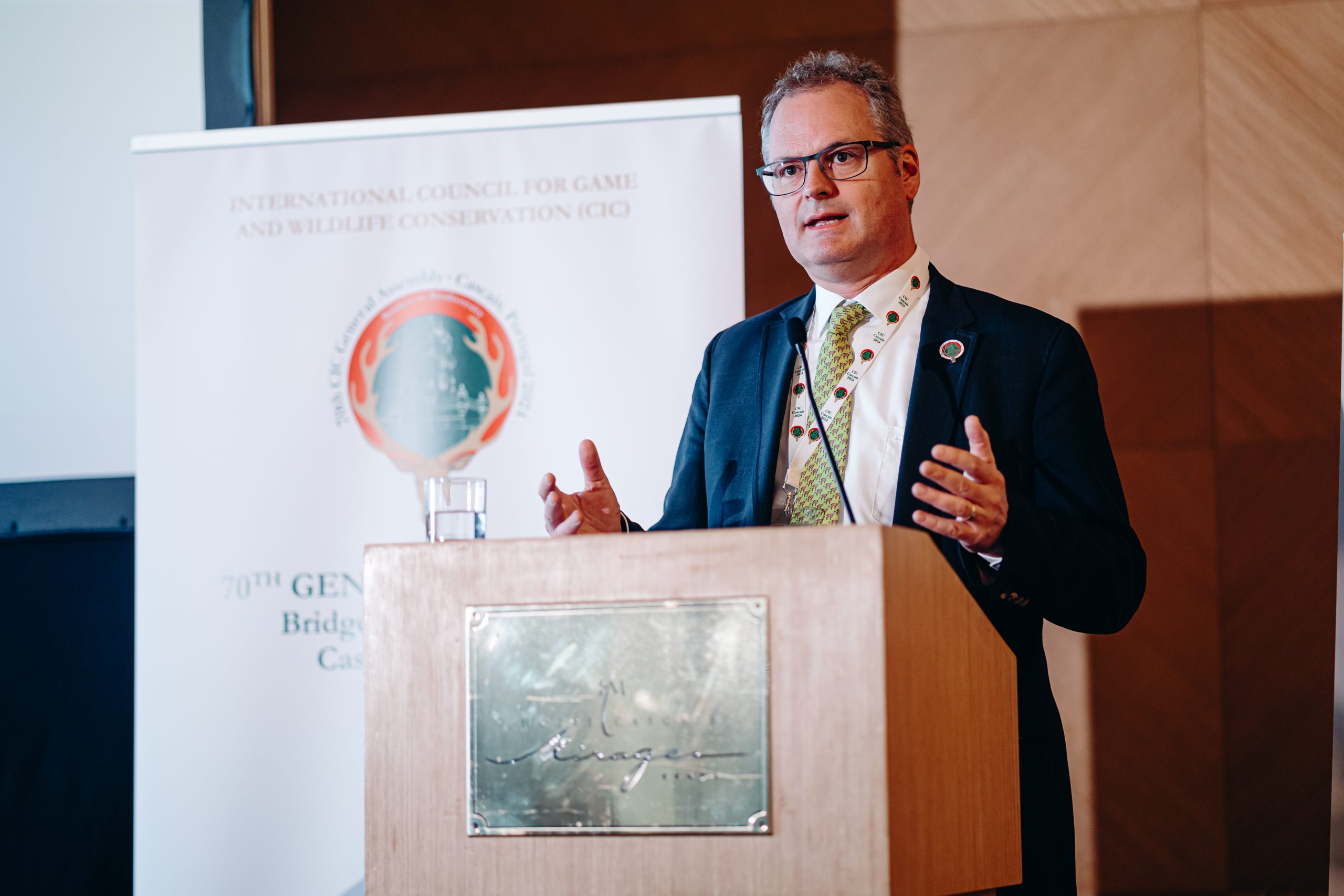
Prof. Dr. Klaus Hackländer, President of the CIC Applied Science Division
As part of this session, Prof. Dr. Klaus Hackländer, President of the CIC Applied Science Division, gave a keynote presentation on research into the impact of climate change on chamois populations.
He opened by discussing the challenges faced by chamois, referencing the effects of hot summers on the species’ wellbeing and the impact of heat on young chamois feeding. It was noted that the species will most likely be upgraded in the IUCN Red List of Threatened Species, thus affecting hunting options. There is currently a lack of data pertaining to population status, as research is currently carried out only in the Alps and not in other ranges.
He pointed to new results from the Grisons, Switzerland highlighting that chamois move to higher altitudes, to denser forest areas and to northern slopes in response to hot summers. The study also found that animals are more active at dawn and dusk – when the days are hot – but are not affected by human presence in their territory.
Overall, it was stated that while knowledge on chamois has increased in the past decade, only 16% of all studies focused on conservation and management. He called for the gaps to be filled, calling on the CIC to support studies promoting the sustainable use of chamois in the future.
Awards Ceremony
Communications Award
The Communications Award established to recognise publications and communications efforts that highlight different aspects of nature conservation through the sustainable use of wildlife resources.
The 2024 Communications Awards was awarded in two categories:
- The Literary Prize
- The Technical Prize
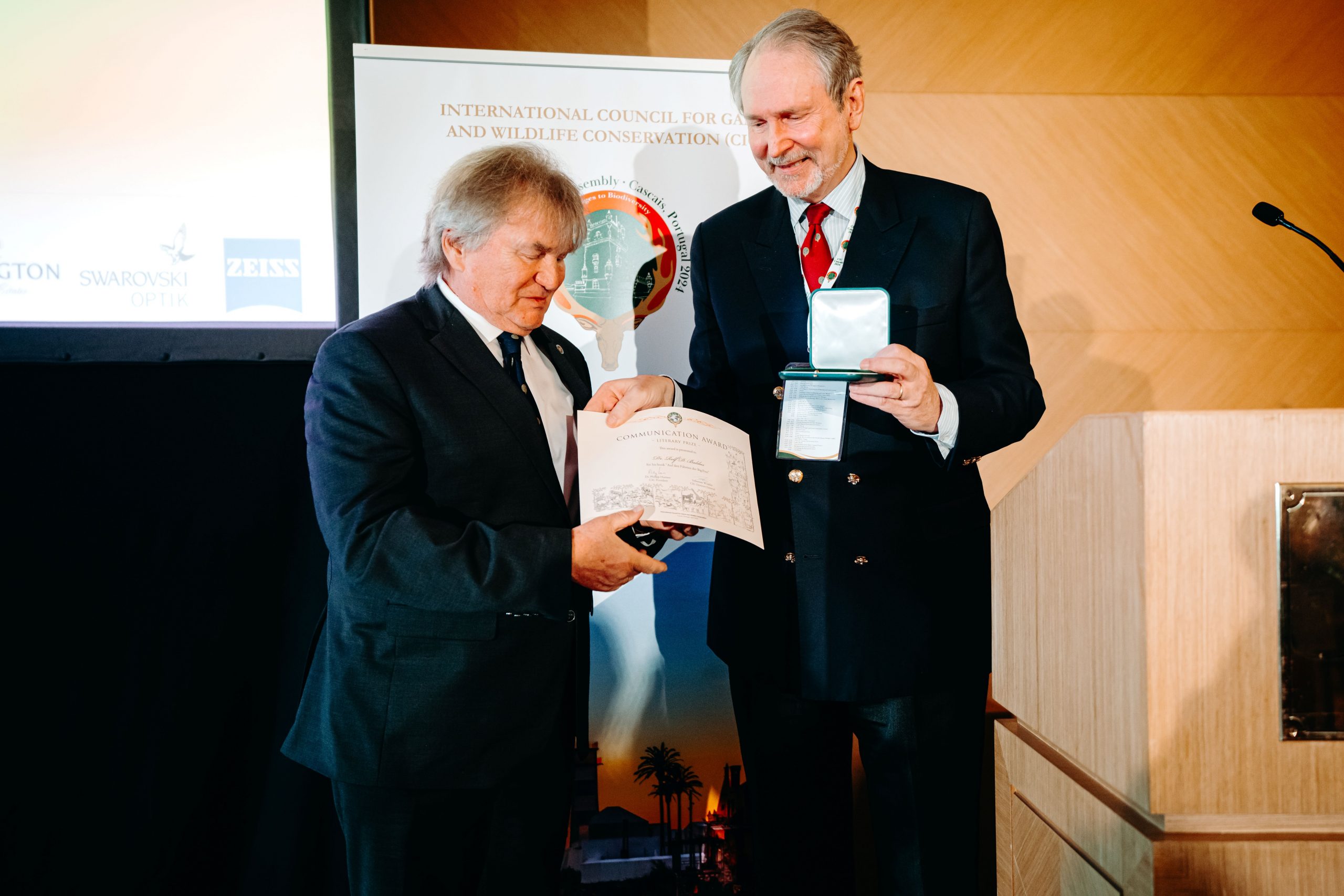
Dr. Rolf D. Baldus, CIC Advisor (left)
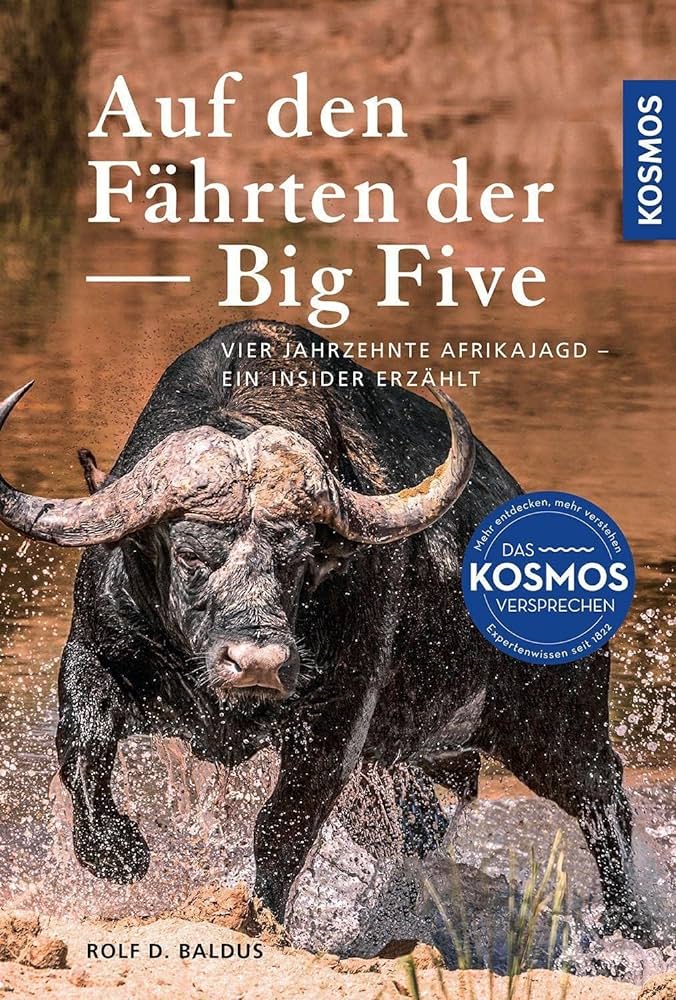
Baldus, Rolf D. (2023) Auf den Fährten der Big Five. Franckh-Kosmos Verlag, Stuttgart
The Literary Prize was awarded to Auf den fährten der Big Five (2023) – On the tracks of the Big Five – a book authored by CIC Advisor Dr. Rolf D. Baldus on the story of his life as an international hunter and conservationist.
From his first unsuccessful hunting efforts as a hitch-hiker in Canada, to his many years working in African game reserves and his experiences of working and hunting with rural communities, the book is a self reflection on the realities of sustainable hunting and wildlife use.
The CIC Jury selected this nomination for shining a light the topics of human-wildlife conflict and community based conservation.
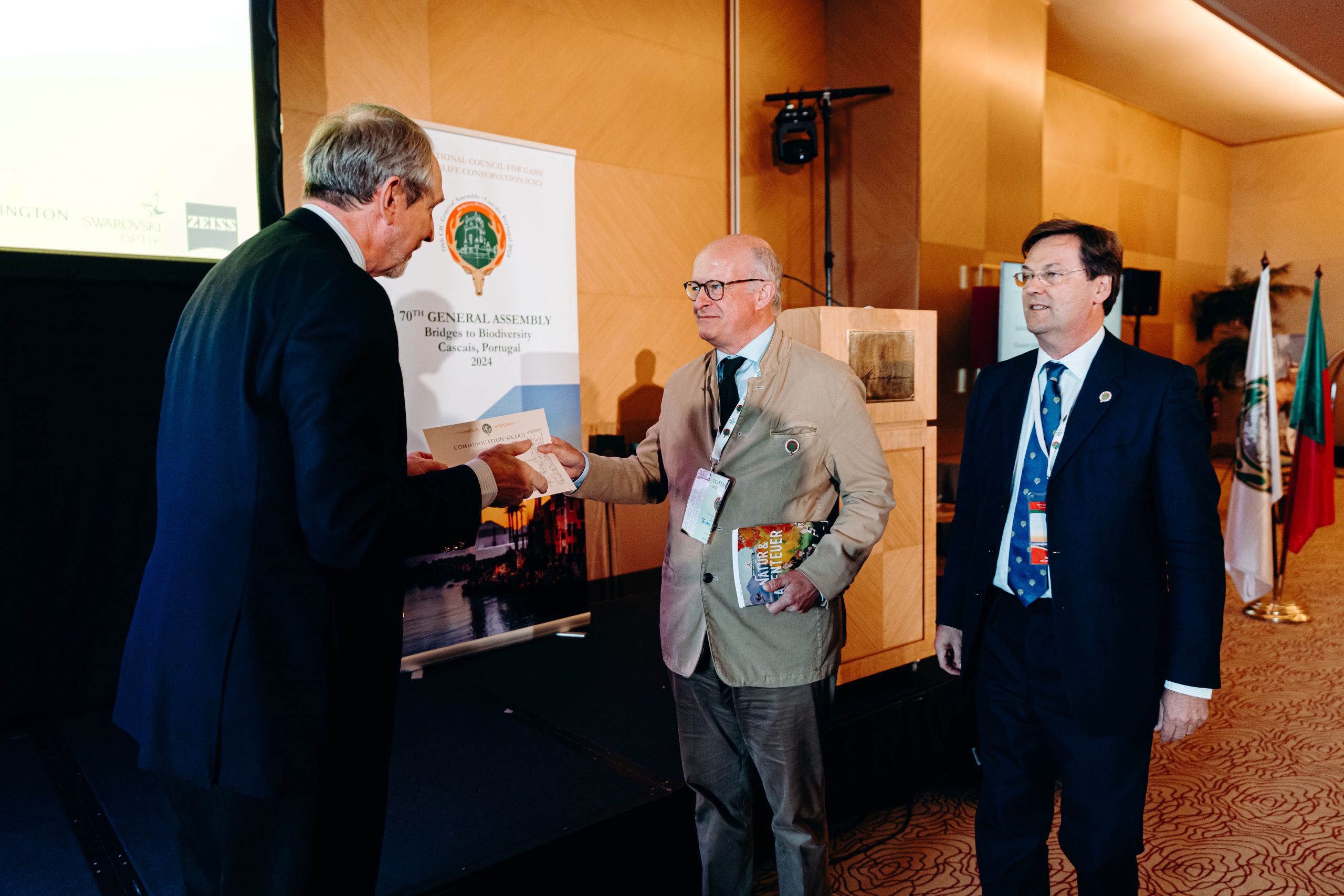
Thierry de Loriol, Head of the Swiss Delegation of the CIC (middle)
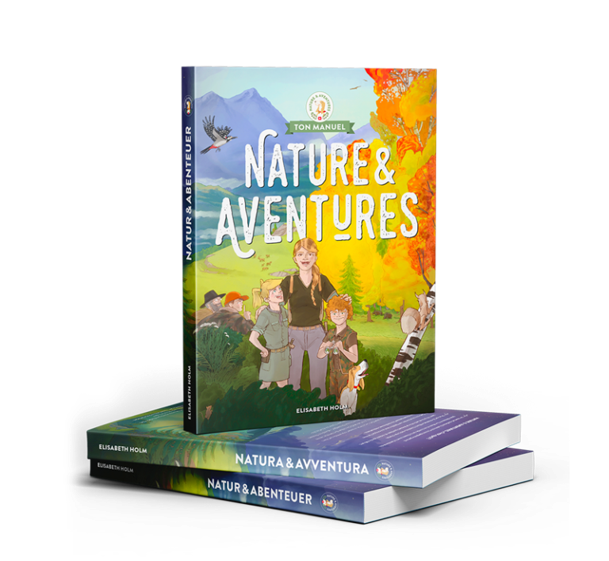
Holm, Elisabeth (2023) Nature & Aventures.
The Technical Prize was awarded to Nature & Aventures (2023) – Nature & Adventure – a children’s handbook that aims to familiarise young audiences with nature and hunting.
This nomination was recognised by the CIC Jury for its work to build up the next generation of conservationists, by introducing wildlife to children in a playful and approachable manner.
The author, Elisabeth Holm, was sadly not present in Cascais to receive the Prize in person. A special mention was given to Julia Dubuis, Vincent Huther, Fanny, Michaël Giangreco and Colin Montet for their graphic and design work.
Receiving the Technical Prize on behalf of the Nature and Adventure Team on stage was Thierry de Loriol, Head of the Swiss Delegation of the CIC; the book is a project sponsored by the Swiss Delegation.
Edmond Blanc Diploma
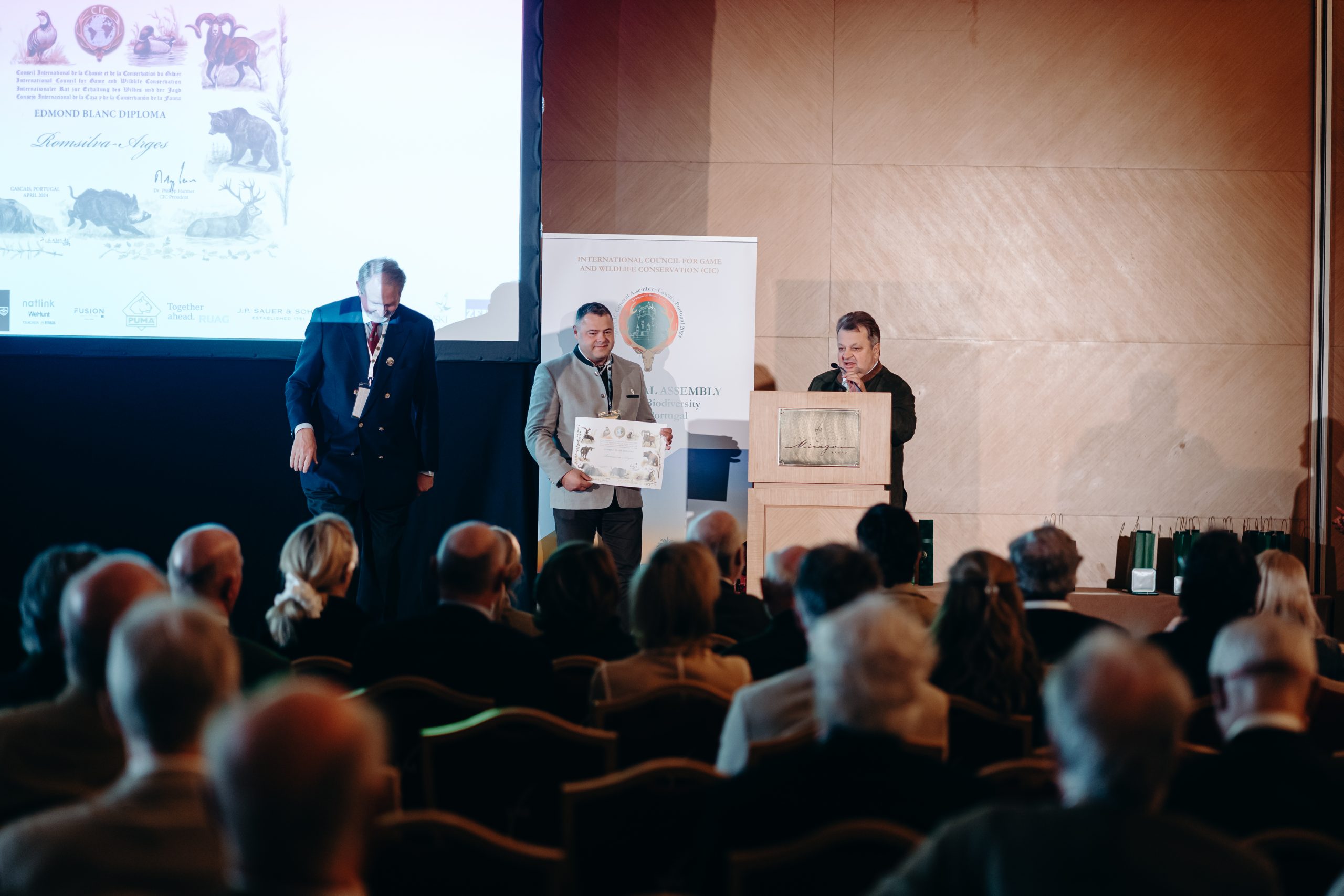
From left to right: Dr. Philipp Harmer (President of the CIC), Armand Chiriloiu (General Director of Romsilva-Arges) and Arpad Sarkany (Vice President of the CIC)
The Edmond Blanc Diploma awards outstanding efforts in wildlife conservation and game management that are based on the principles of sustainable wildlife use. Last year, the Diploma was awarded to Erongo Verzeichnis (EV) for their Age Related Trophy Measuring System.
The 2024 Edmond Blanc Diploma was presented to Romsilva-Arges, a State Forestry Area in Romania.
Acting under the authority of the Ministry of Environment, Waters and Forests, one of the principal targets of Romsilva is to boost the health and conditions of state forests while producing national timber and other wildlife products.
Romsilva also acts as a horse breading authority, coordinating and implementation of the national programme for the genetic improvement of equines.
Armand Chiriloiu, General Director of Romsilva-Arges, received the award thanking the CIC and noting in particular the work in Arges to support the sustainable management of chamois.
Vice President of the CIC, Arpad Sarkany, also took the stage to praise the work of Mr. Chiriloiu as a wildlife manager, while mentioning that it is an honour for Romania to receive this recognition by the CIC.
CIC Silver Merit and Gold Medal Recipients
Silver Merit
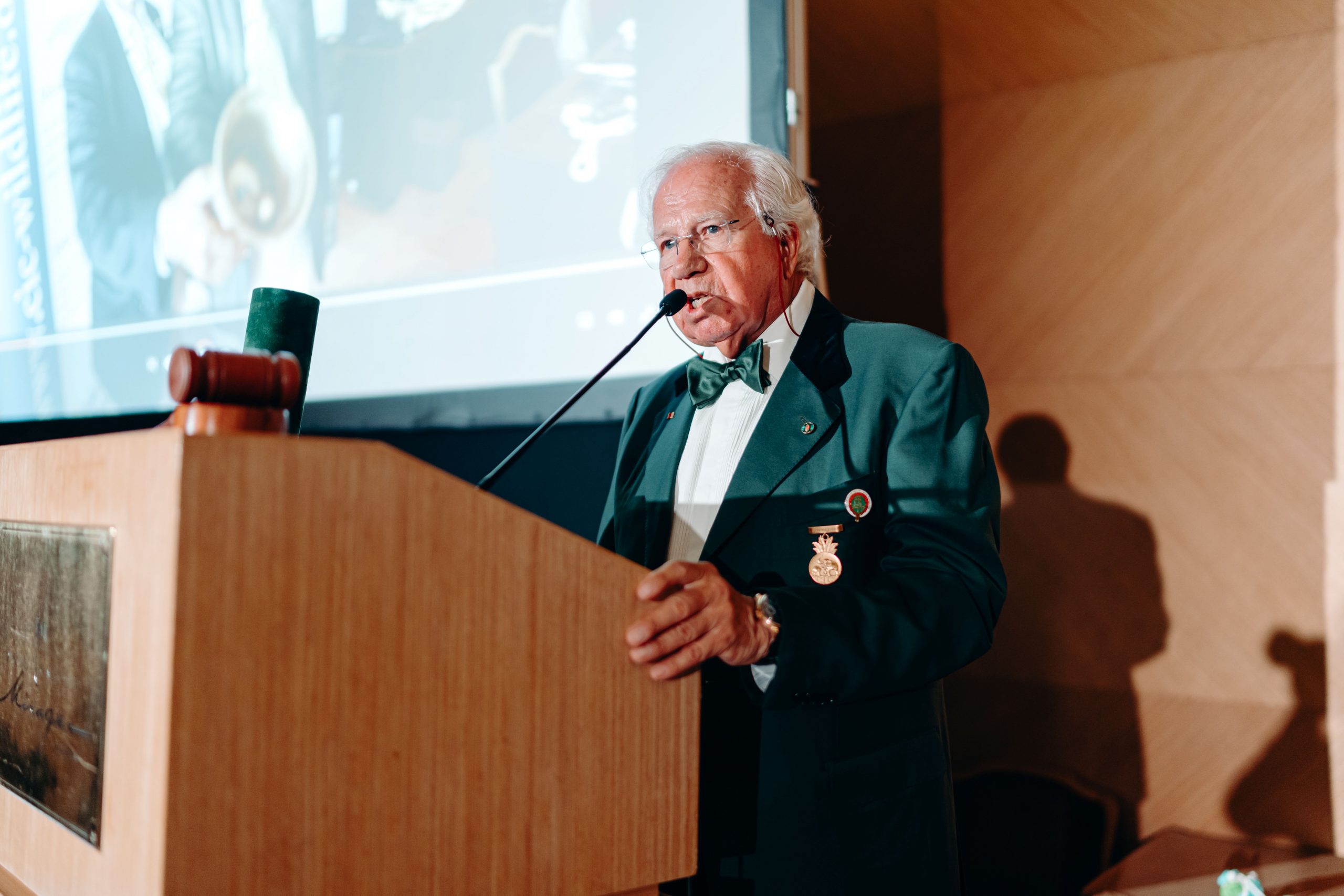
Dr. Rudolf Gürtler
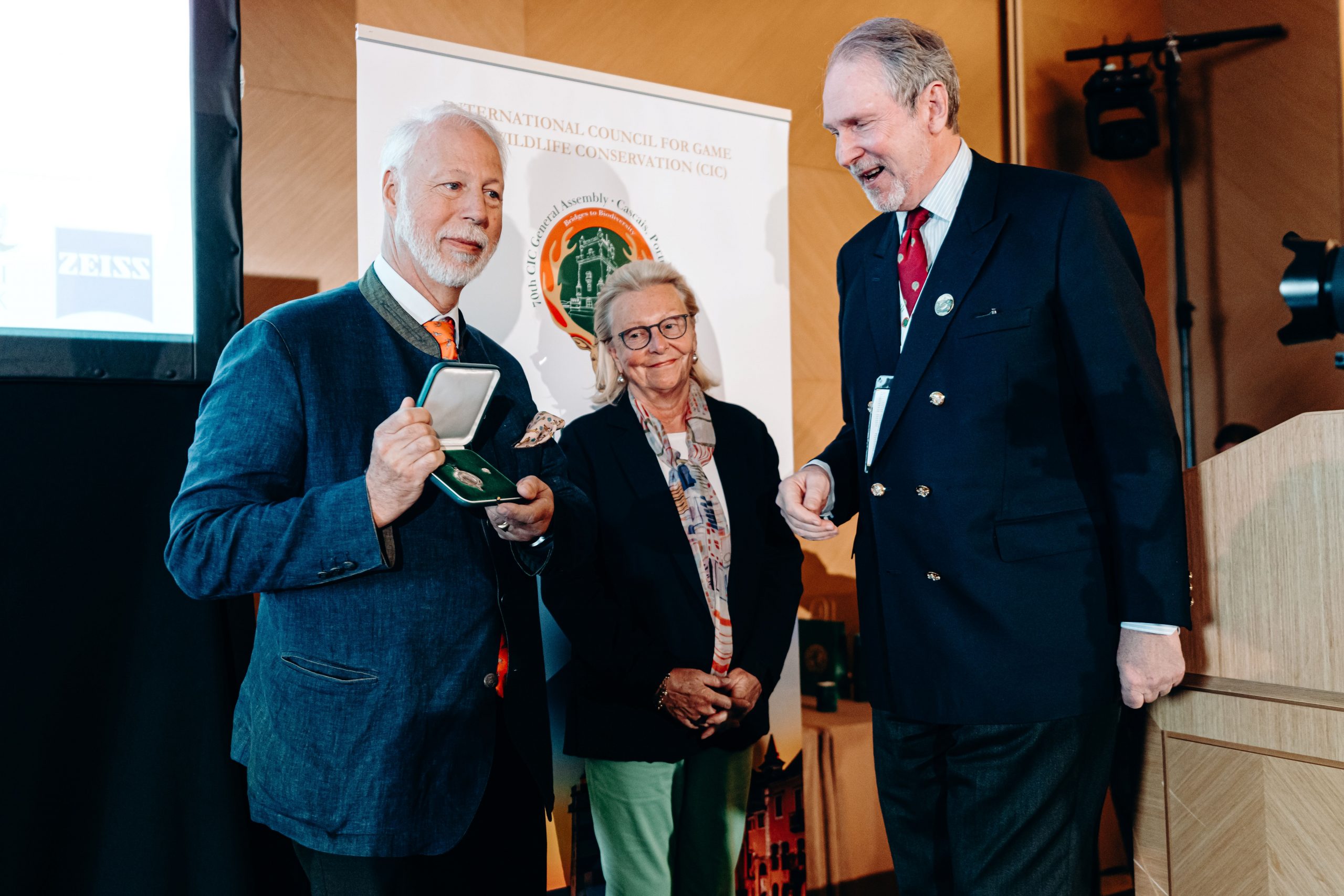
Olivier Rolin Jacquemyns (left)
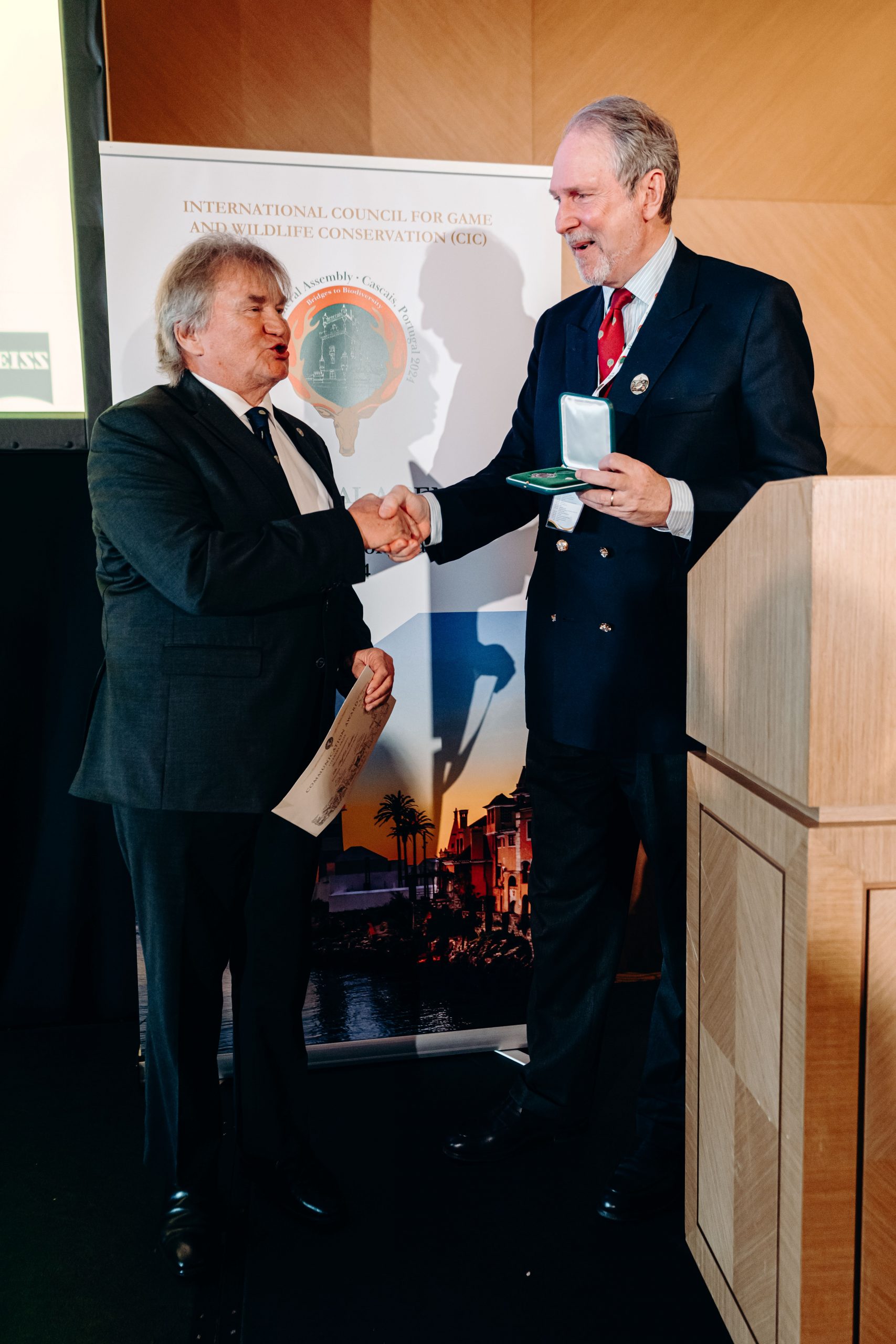
Dr. Rolf D. Baldus, CIC Advisor (left)
Gold Medal
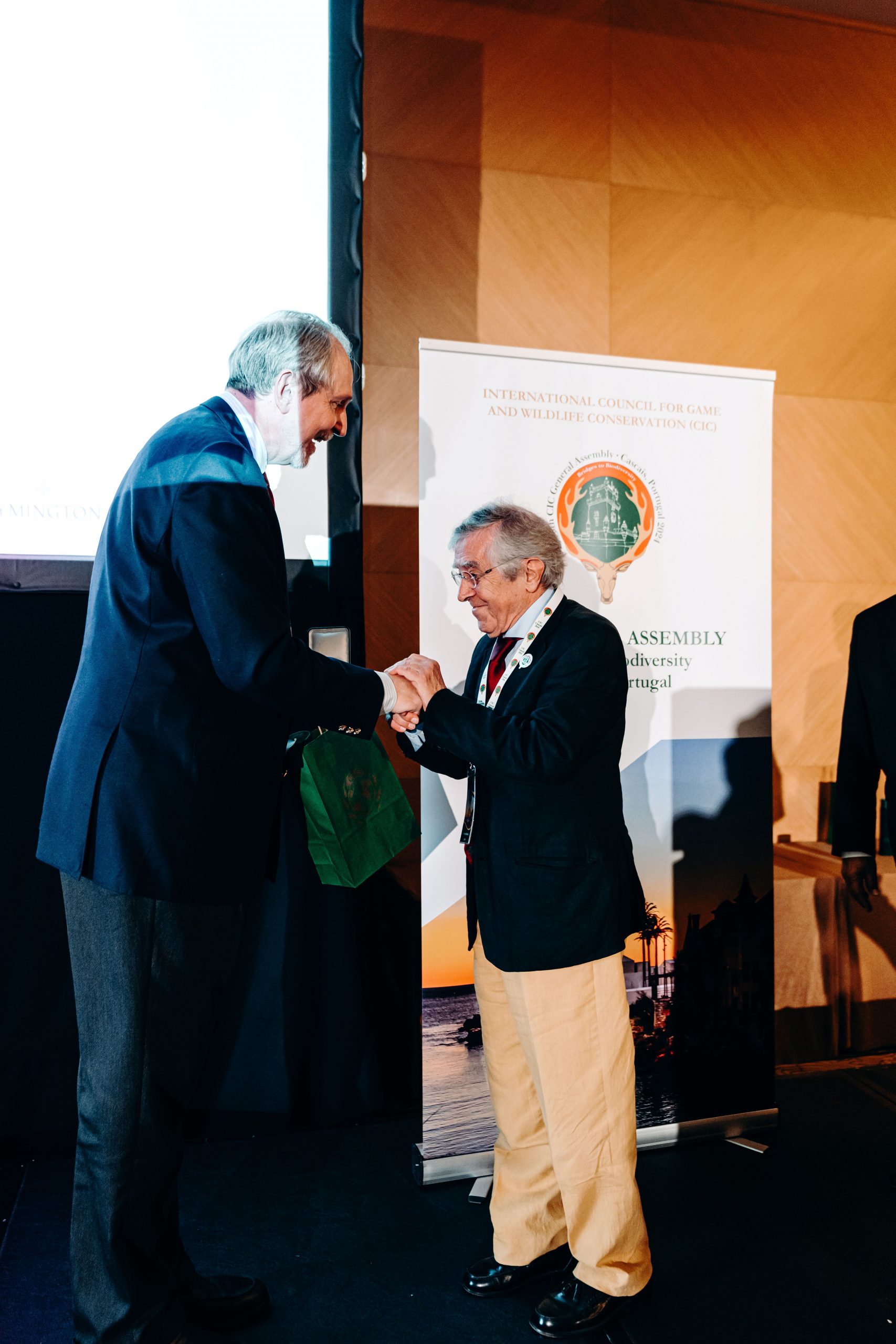
Álvaro Moreira, Head of the Portuguese Delegation of the CIC (right)
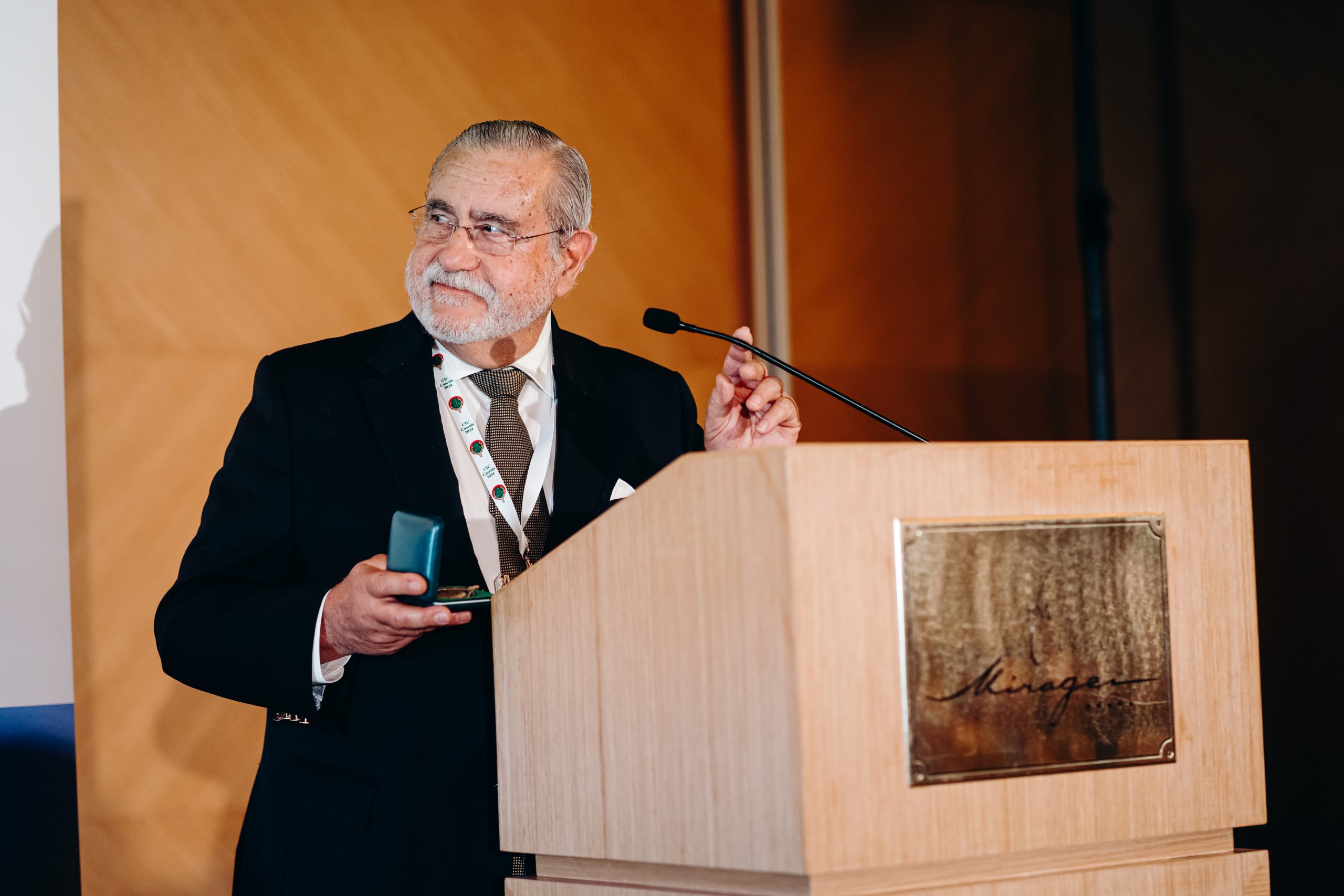
Dr. Artur Torres Pereira, President of CIC Portuguese National General Assembly & President Clube Português de Monteiros
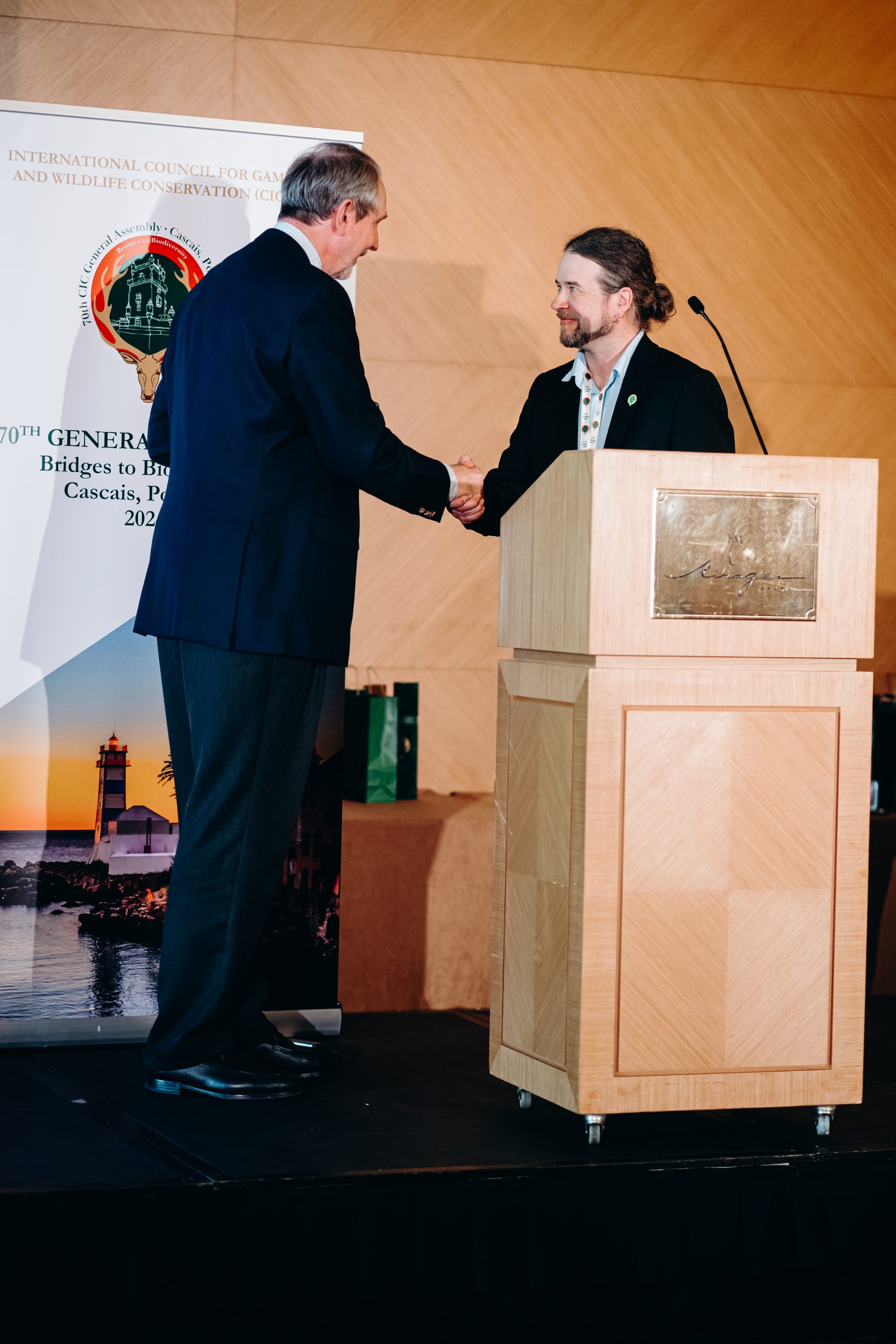
Mikko Rautiainen (right)
Gold Medal Recipients who were not present in Cascais to receive their award:
- Johannes Fürst
- Jukka Bisi
- Ralf Müller
- Tibor Lebocký
